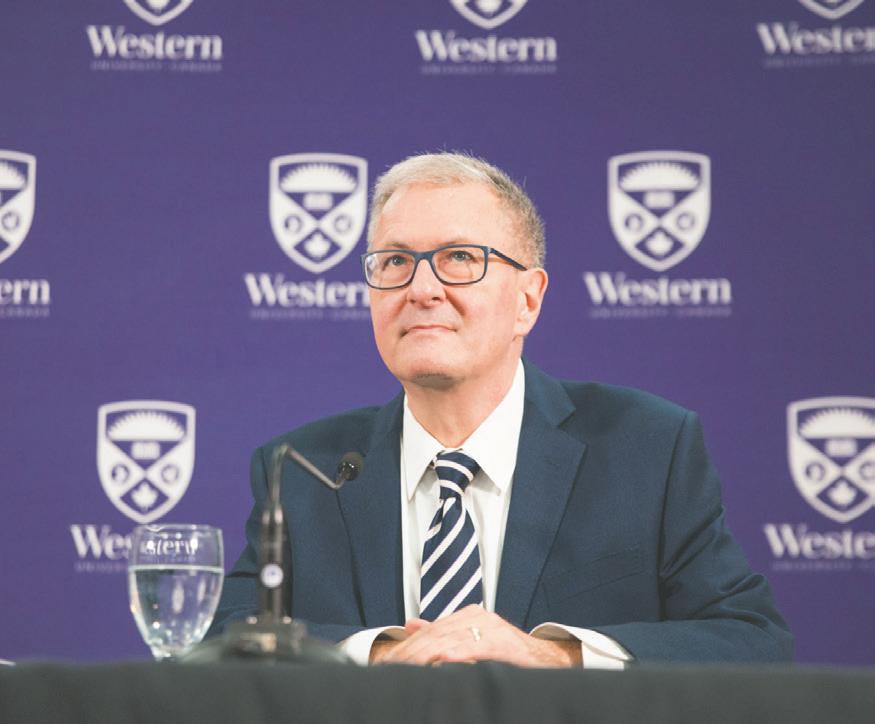
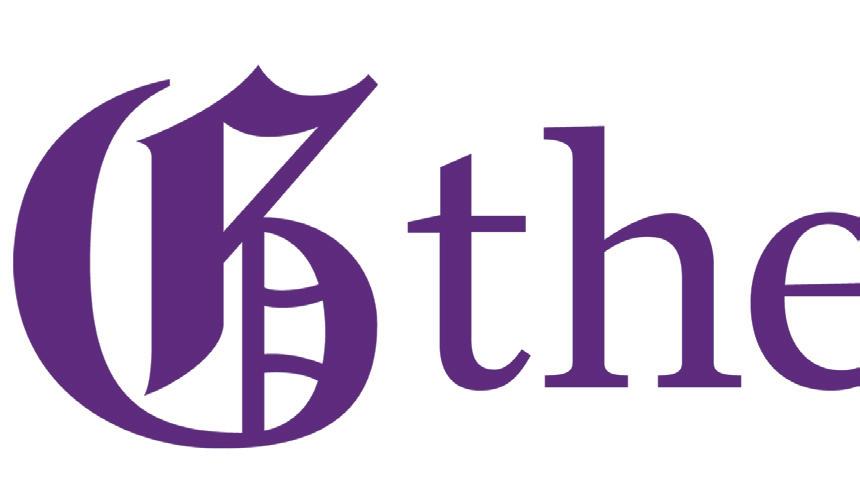
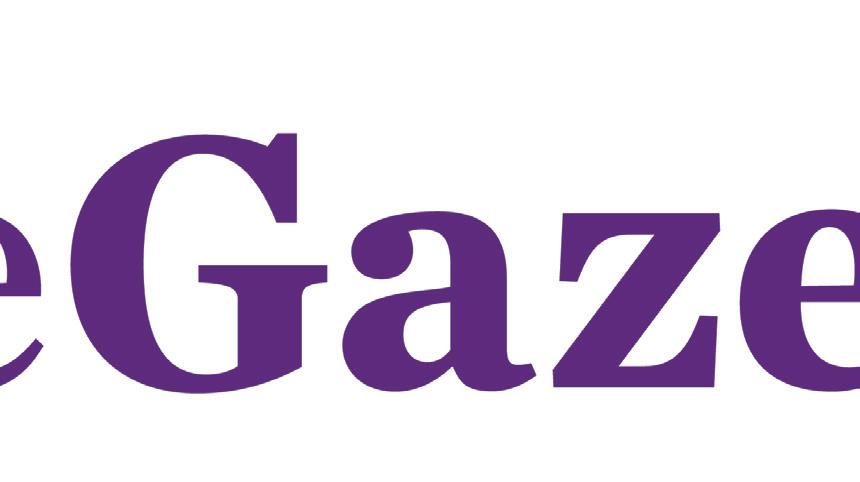
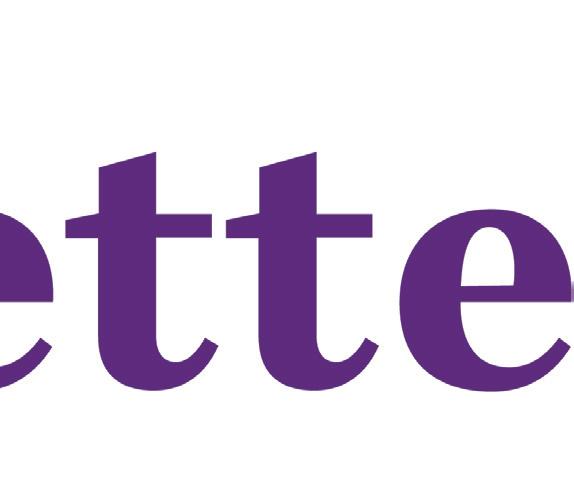




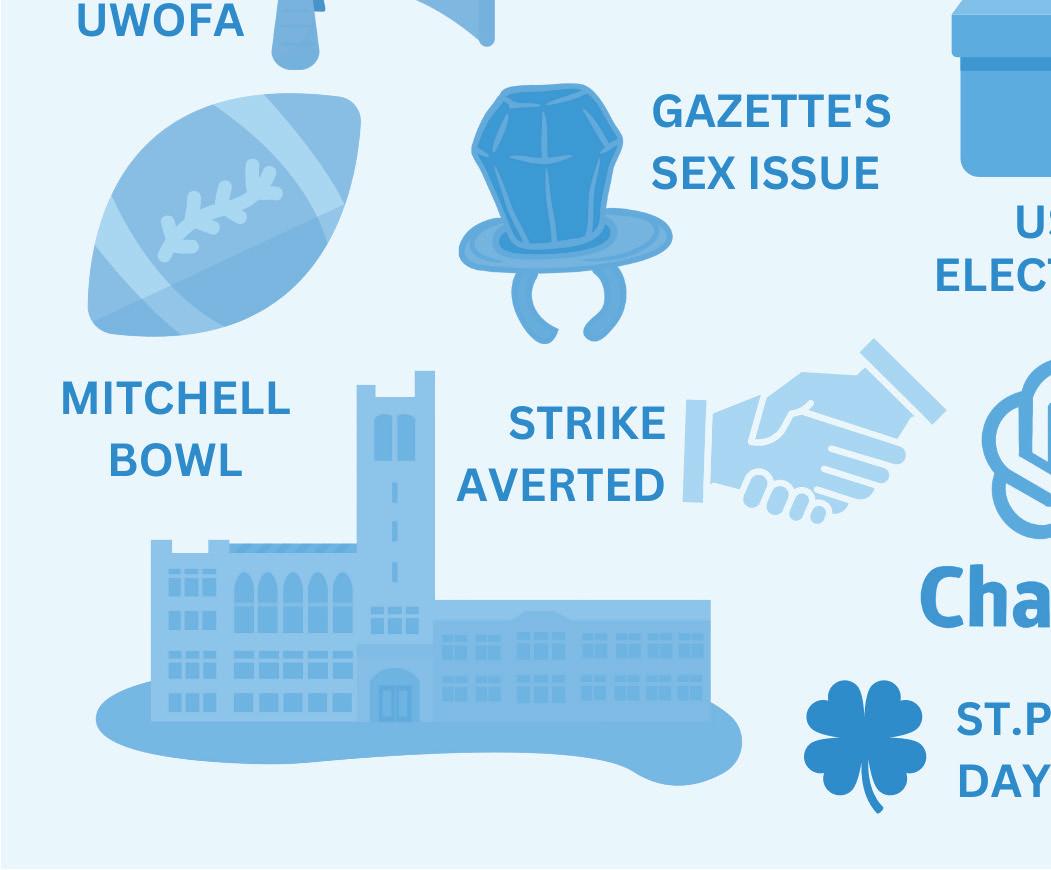

APRIL 6, 2023 VOLUME 116 ISSUE 9 since 1906 CULTURE NEWS Shepard highest-compensated Ontario uni president in 2022 Meet Winder: Tinder, but for Western students P3 Summer courses feel like a vacation P8 SPORTS Pressure Point: How performance anxiety a ects student-athletes P11 OPINION P12
REBECCA STREEF, ARISIA QARRI, JESSICA COUNTI GAZETTE
Western University’s o cial student newspaper since 1906
VOLUME 116, ISSUE 9
APRIL 2023
University Community Centre Rm. 263
Western University London, ON, CANADA N6A 3K7
Editorial editor@westerngazette.ca
EDITOR-IN-CHIEF HOPE MAHOOD
DEPUTY EDITOR
ALEX MCCOMB
MANAGING EDITOR
SARAH WALLACE
Police enter Saugeen; o cers detain 1
HANNAH ALPER REPORTER
Western special constables and London police, some armed with guns, shields and a battering ram, came to Saugeen-Maitland Hall March 30th and led an individual in handcu s out of the residence and into a police car.
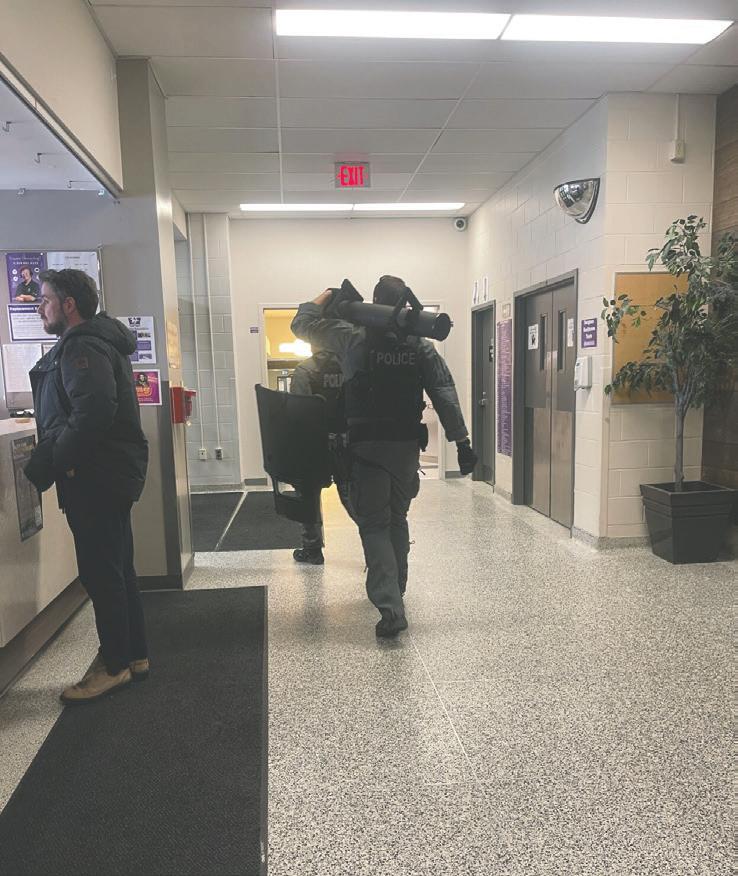

It is unclear if the individual, who appeared to be a young man, is a Western University student.
In an email sent to Saugeen residents March 30th night, director of Housing Chris Lengyell said a police came “after receiving a call regarding a potential incident in the residence.” He said the police investigation “determined there was no safety concern.”
Western and police have not provided further detail about the “potential incident” reported.
Approximately 10 minutes after police detained the individual in one of several police and special constable cars on the scene, they escorted them back into the building. The individual was wearing a bathrobe and sneakers.

London Police Services said they were assisting Western with a situation and that o cers from the LPS Emergency Response Unit were present. The Emergency Response Unit is a specialized service that supports police in “high-risk incidents.” O cers on the scene were armed and running in and out of the building.
“I’m honestly surprised that this did not happen earlier in the year. I mean, it’s Saugeen,” said Veronica Kawa, a first-year Engineering student living in Saugeen.
It is unclear why the individual was detained.
Western to build 2 new residences
ADSHAYAH SATHIASEELAN NEWS EDITOR
Western is currently planning two new residences — one for first-year students and another for upper-year and graduate students.
Western University president Alan Shepard told the Gazette in an interview that the university is currently choosing building sites.
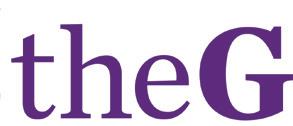
several factors in the early planning stages, including architectural design, building height and residence style.
EDITORIAL SUPPORT MANAGER



DAN BROWN
GAZETTE CONTRIBUTORS
JESSICA COUNTI
TAYLA DOYLE LAILA EL ATTAR
MONIQUE FLEMING
EMILY GALLUZO MAYA LOUBANI
The proposed residences will allow the university to maintain their first-year residence guarantee as they aim to increase student enrollment to 50,000 students by 2030.
MAS ON LYN SHRE YA
THIS COULD BE YOU!
Send us an email at managing@westerngazette.ca

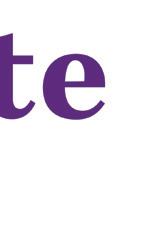
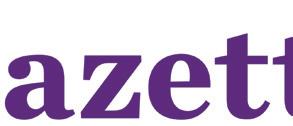
@UWOGAZETTE
@UWOGAZETTE
@WESTERNGAZETTE
/ WESTERNGAZETTE



/ WESTERNGAZETTE /UWOGAZETTE
WESTERNGAZETTE.CA
All articles, letters, photographs, graphics, illustrations and cartoons published in the Gazette both in the newspaper and online versions, are the property of the Gazette By submitting any such material to the Gazette for publication, you grant to the Gazette a non-exclusive, world-wide, royalty-free, irrevocable license to publish such material in perpetuity in any media, including but not limited to, the Gazette’s hard copy and online archives.
The university recently decided to also build an upper-year and graduate residence in response to the housing needs on campus for graduate students. The school recently froze Bayfield Hall’s transition into a first-year residence and said it had no plans to create more rooms for firstyear students until the university constructs new graduate student residences.
Shepard said the ideal construction timeline is “sooner rather than later.”
“Our residences continue to be wildly popular with our students, and relatively speaking, they are a bit under market in their pricing so we’re happy about that,” he said.
Shepard added the school hopes additional graduate student housing will alleviate the stress international students face of having to “start legal contracts with landlords” and first arriving in Canada.

“We find there is a disproportionate demand for international students and most of them want to live in residence than you would have for domestic graduate students,” said Shepard. “So that’s trying to meet that need as well.”
Shepard explained Western is considering
“You could build a neo-gothic look like the [other residences], something really wild and crazy or something in-between,” said Shepard. “Are we building a tower or three-storey? I think those are all options on the table.”
Shepard explained these decisions will be influenced by the needs and interests of students, as well as the latest on-campus housing trends in North America.
While Shepard was accustomed to tradition-
al-style residences during his time as a student, he mentioned the di erence with the latest built Western residence — Ontario Hall in 2013 — being a hybrid suite-style.
Shepard explained that while there is currently a significant amount of stress on the London housing market, creating housing demand, the market situation may not last. He added that if the university overbuilds, then they could end up with a lot of space that’s been paid for but with no demand.
“It’s very tricky to get it right,” he explained.
MENON ARISIA QARRI ADAM TAIMISH NEWS | P2 OPINIONS JORDAN BLOOM HANNAH ALPER STAFF REPORTERS JESSICA KIM VERONICA MACLEAN COPY ELIZABETH HART SCOTT YUN HO GRAPHICS REBECCA STREEF KAT HERINE G UO PHOTO SOPHIE BOUQUILLON VIDEO REBECCA BARTKIW MADELEINE MCCOLL ROMANO WATT MINA AHMAD SOCIAL MEDIA ELIZABETH HART PE’ER KRUT CHIARA WALLACE COORDINATING EDITOR (VIDEO AND FEATURES) LUCAS ARENDER COORDINATING EDITOR (CULTURE AND SPORTS) BIANCA COLLIA ART DIRECTOR CASSANDRA KACZMARSKI NEWS ANDY YANG ESTELLA REN ADSHAYAH SATHIASEELAN SONIA PERSAUD CULTURE LAUREN MEDEIROS CAT TANG DANIELLE PAUL SPORTS MILES BOLTON KIERAN DROVER RYAN GOODISON
CHIARA WALLACE GAZETTE O cers escort an individual from Saugeen-Maitland Hall to a police vehicle, March 30, 2023.
CHIARA WALLACE GAZETTE O cers in Saugeen-Maitland Hall with a battering ram and a shield, March 30, 2023.
CHIARA WALLACE GAZETTE Police vehicles parked outside of Saugeen-Maitland Hall, March 30, 2023.
YIFEI ZHANG GAZETTE Ontario Hall's front entrance, Oct. 27, 2020.
Alan Shepard highestcompensated public Ontario uni president in 2022
SONIA PERSAUD NEWS EDITOR ADAM TAIMISH NEWS INTERN
Western president Alan Shepard was the province’s highest-compensated university president in 2022, earning $518,718 between his salary and benefits.
Last year, Shepard earned a $479,600 salary in addition to $39,118 in taxable benefits — making him the highest-paid president of all public Ontario universities. He also received the highest salary of Ontario university presidents and was second to University of Toronto president Meric Gertler for benefits.
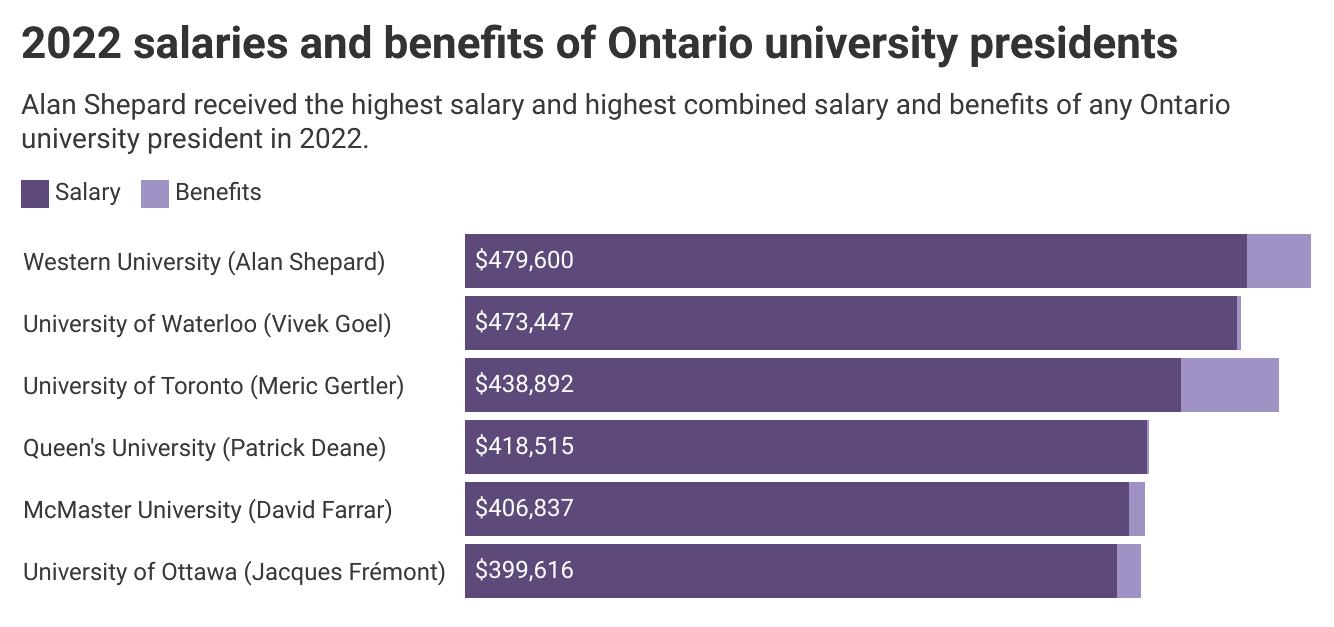
This is a decrease in salary for Shepard since 2020 — he earned $484,000 with $37,849 in benefits in 2021 and $484,000 with $38,683 in benefits in 2020. Shepard was appointed Western University’s president in July 2019.
In an email to the Gazette, the university said senior executive compensation reflects a “complex set of metrics and factors,” and “small fluctuations in salaries” can occur as a result.


Even though Shepard was Ontario’s highest-compensated university president, he wasn’t Western’s top earner.
The university’s highest earner in 2022 was Sharon Hodgson, the Ivey Business School’s dean, who earned $578,760. She was paid the 42nd highest salary of all public sector employees in Ontario, and the second highest of any university sector employee — second only to UofT professor Brian Golden, who earned $593,206.
“Business schools compete for leadership talent in a global market in both the public and
private sectors, and deans’ salaries generally reflect that competitive landscape," said Western. Hodgson wasn’t the only Ivey faculty member topping Western’s earnings list. Twenty-three of the top 50 earners — including four of the top 10 — were from Ivey. Another 10 from the top 50 were from the Schulich School of Medicine and Dentistry.

The Ontario government’s annual public sector salary disclosure — also known as the Sunshine List — provides information about the salaries and benefits of public sector employees paid more than $100,000 annually. In 2022, 1,590 Western faculty and sta made the list.
At Western, the top 10 earners alone made a combined $4,436,667 — and the university’s top 50 earned a collective $17,045,106. For the top 50, this number is up over $500,000 since 2018.
As the highest-paid employees’ earnings increased, so did the number of employees with salaries of over $100,000. In 2022, Western had 1,589 employees making at least six figures. This number has steadily increased over the last five years, with 214 more employees in this category since 2018.
As of the 2020-21 school year, Western employed 2,468 sta and 1,356 faculty members. On the sunshine list, 1,290 Western employees making six figures in 2022 had either professor or lecturer in their job title.
Meet Josh Morgan: London’s Mayor and Western alum
As Josh Morgan first walked through the doors of the University Community Centre on Western’s campus 25 years ago, he took his first steps out of his rural Ontario bubble. It was, admittedly, the first time he was exposed to di erent expressions of culture, faith, organizations,and people outside of his hometown of Plympton-Wyoming, Ont..
“[Western University] made me realize how much I didn't really know about the rest of the world.” Morgan said.
“Plympton is just not known for diversity and multiculturalism and all the things that we really value in a major city like London.”
Morgan had an unconventional path to politics. The new London, Ont. Mayor initially attending Sheridan College for visual art and animation. While he loved art, he realized animation wasn’t the right career for him.
After going back to high school for a year to finish the required courses and exams to apply to university, Morgan enrolled at Western, where he received his bachelor of arts in economics and political science in 2002 and a masters in political science in 2004. Western would become his stepping stone in London politics and he credits the university for igniting his passion and career.
Morgan’s initial gateway into politics started at Alumni House as a representative on the university’s Residence Council. He jokes that his floor drafted him into this position.
“During my time there, I came to enjoy it. I was also in Social Science Faculty, I thought, ‘I don't know what this Social Science Council does’,” he says. “So I'm just going to run for president and
figure out what they do.”
He won by 12 votes.

Morgan was later elected as a student senator and then University Students’ Council vice-president. It was at the USC that his passion for politics was born, with no sign of stopping.
“It just kind of snowballed. From there, I found that I was good at it and I enjoyed doing it,” Morgan says. “I liked representing and helping people. That's kind of what inspired me to want to be involved beyond university, politically.”
Rather than heading to a bigger city like Toronto to build his political career after graduation, Josh stayed in London. In 2009, he became the recruitment and development o cer of West-
ern’s Local Government Program — a program educating current and future municipal leaders in the field of public administration.
Not quite leaving Western in the rearview mirror, he took on other positions before his term as deputy mayor in 2020 and now sits on the universities Board of Governors.
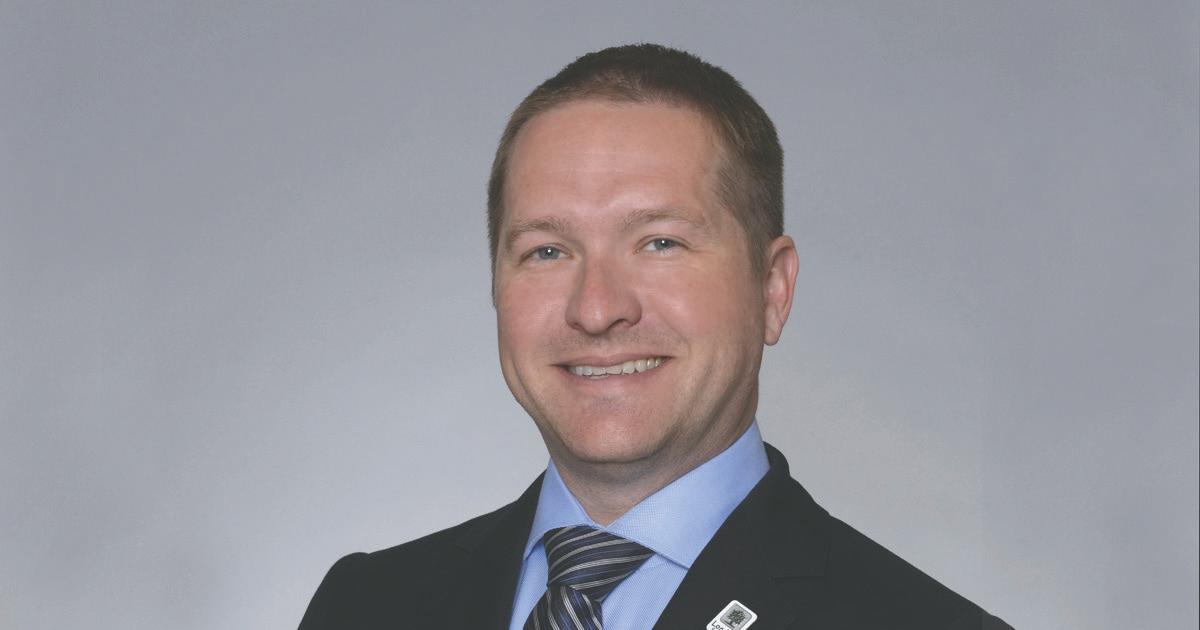
As one of the youngest mayors the city has ever seen, what some might see as a disadvantage Morgan sees as a strength. Running on a platform of economic prosperity, housing and a ordability, mental health and addictions, climate change and making London an inclusive city, Morgan hopes to engage more students.
His plans to be more active with students
include working with the university administration, the USC, local councillors and finding opportunities for students to be involved in the greater London community.
“I want to reach out to students and encourage as many to stay as possible. We are one of the fastest growing economies and cities in the country and we need talent from the university [and] college to stay here and contribute to the many jobs that are coming,” says Morgan.
“One of the most valuable things I did as a student was starting to think beyond just the campus. There's much more to the community that I took advantage of in my later years of university.”
Morgan is tasked with tackling some daunting issues throughout his term that both Londoners and students alike are impacted by, including housing and homelessness — planning to build a permanent and sustainable system to help Londoners experiencing homelessness and make use of a $25-million donation made by an anonymous London family.
Gender-based and sexual violence prevention is another issue Josh focused on in his election — an issue that was at the forefront of conversations on-campus in 2021. He sees students as a vital part of these plans.
“Whether you want to be here for four years, six years, 10 years or for the rest of your life, we need your talent, intelligence, perspective, to help truly build a great city,” Morgan says. “I'm going to be reaching out to students, but I need them to make that decision to be involved in their wider community and make their voice heard.”
NEWS | P3
SONIA PERSAUD CREATED WITH DATAWRAPPER
HANNAH ALPER REPORTER
COURTESY OF CITY OF LONDON
‘It is Indescribable’: Pain of the Turkish-Syrian earthquake still felt by Western students 2 months later
Sara Dahan looks down as her phone lights up with a text. It’s from her aunt back in Syria, messaging the family group chat.
“Update me, how’s everyone?” Dahan’s aunt Noura asks the family, many of who also live on neighboring streets in Aleppo, Syria.
“Update me — on what?” replied Dahan, unaware her family had just experienced one of the deadliest natural disasters in history.
The news hadn’t reached the media yet — a 7.8 magnitude earthquake had hit Turkey and Syria overnight, leaving many under the rubble, displaced or dead.
“It is indescribable,” replied Dahan’s aunt Noura.
The earthquakes, which began on Feb. 6, have claimed the lives of over 50,000 in Turkey and Syria. Over 1.9 million survivors have taken refuge in temporary shelters, tents and container homes in Turkey, while 55,000 to 200,000 have become homeless in Syria. These add to the nearly two million who were already living in refugee caps following the 12-year civil war.
take the week o for her mental well-being.
She believes her professors were expecting many Turkish and Syrian students to request accommodations, after seeing the horror and damage of the quake on social media. Almasalmeh said her own traumatic memories of the war left her feeling numb towards the tragedy of the quake, longing for a better future for her people.
“I wasn't physically and mentally able to cry,” says Almasalmeh.
Dahan, a second-year consumer behavior student from Aleppo, Syria, sat at her desk trying to go about her studies, but all she could think about was her family back home. She is one of the 175,000 Turkish and Syrian people living in Canada feeling the shockwaves of an earthquake 8,000 kilometres away.
For many Syrian students, this is not the first time they have experienced this type of trauma.
Maya Almasalmeh, a second-year psychology student from Daraa, Syria, says news of the earthquake triggered flashbacks of the first bombing of her city in 2011. She was one of the 52 per cent of citizens that were displaced from Daraa 10 years ago.
Seeing the pictures emerge on social media of the quake’s impact on citizens in Syria took a mental and physical toll on Almasalmeh's health. She describes many sleepless nights and days when she couldn’t bring herself to attend classes or go to work.
While dealing with the trauma of the quake’s aftermath, Almasalmeh says her professors were understanding of her absence, allowing her to
After the first earthquake shock, Dahan’s family took refuge in their cars until the morning, waiting for the earthquake aftershocks to cease. They describe the terror of the quake as never-ending, saying it was even worse than the bombing they had witnessed during the Syrian civil war.
Noura described to Dahan that her young cousins, aged nine and 10, continued to shake and throw up for hours after the initial shock. They are among the millions of children in Syria who have never known a normal childhood — living through 12 years of the civil war and now the deadly earthquakes.
“Their entire childhood has been traumatizing,” says Dahan.
Although the news surfaced in the media hours after thousands had already fallen victim, Dahan and her immediate family in Canada kept in contact with those in Aleppo through their group chat, frequently checking up on them.
Her semester has been marked by constant e orts to keep in contact with her family abroad.
Alp Polat, a fifth-year physiology student from

Elâzığ, Turkey, was another student who couldn’t bring himself to think about his school work, considering the earthquake’s impact on his family.
Polat, whose cousin was displaced from his house in Hatay, Turkey because of fractures to his building, says he finds himself constantly worried about his cousin and the other victims in Turkey.
It has made it di cult for him to devote his attention to his assignments and school work.
Polat can’t help but think about how much needs to be done to rebuild his hometown in Turkey.
them,” says Dahan. “You can’t really do much when you’re outside [of the country].”
Mercan says she didn’t know how bad the damage was because the power lines in Turkey were a ected by the quake, making it impossible for anyone to reach out. People outside Turkey couldn’t contact their families to check up on them, causing more distress for family members on both sides of the world.
Polat believes Turkey’s weak infrastructure is to blame for the quake’s large-scale destruction of residential buildings. He says many buildings are built on floodplains and fault zones, leaving them extremely vulnerable to earthquakes. Mercan adds that houses in Turkey are built out of material that can be punched through, making them quick to collapse.
“It was pretty devastating for the community,” says Polat.
His cousin and other displaced residents have taken to relatives’ homes, afraid to move back to their own houses that they feel are compromised.
The quake also set back Syria's e orts to rebuild the country following the civil war. Coupled with the sanctions placed on Syria, Dahan says many were left abandoned as limited humanitarian aid could reach them.
The urgency of receiving aid was a matter of life or death for those trapped under the rubble of their collapsed homes.
“The entire country really needs help,” says Dahan.
Although the Syrian civil war is at a current ceasefire, an economic crisis and deepening poverty remains. According to Almasalmeh, many Syrians su er from electricity, water and internet shortages. Syrians had already been battling an ongoing cholera outbreak for months, and now with the earthquake, many are turning to temporary shelters with minimal sanitary standards.
Coming up on two months since the quake’s first shock, the media coverage is significantly declining, but Polat believes that, as the world looks the other way, the crisis is only getting worse. Temporary shelters in Syria and Turkey are overcrowded with displaced citizens, making access to toilets, running water and showers scarce.
Going forward, Polat says those displaced will have trouble finding housing and jobs, and overall, trouble returning back to their normal lives.
Polat is not the only student who feels helpless so far from home. Sofia Mercan, a first-year medical sciences student from Ankara, Turkey, says she is doing everything she can by donating, but there’s only so much she can do when she’s over 8,000 kilometres away.
“I feel so disconnected here,” says Mercan.
She explains how di cult it is to watch videos of people in Turkey struggling under the rubble, wishing she could do more for them.
“There’s guilt of — you can’t really be there for
“This probably will have an impact for, I'd say, the next 10 years on these people,” says Polat.
Citizens in Turkey and Syria continue to live uncertain of what tomorrow will bring, while those abroad are doing their best to donate and raise as much awareness as possible. Those in Canada, and at Western University, are doing everything they can to support their people in any way they can.
“I know we are far away but we still see them,” says Almasalmeh.
Western facing potential Scantron shortage for exams
ADSHAYAH SATHIASEELAN NEWS EDITOR
The O ce of the Registrar recently informed several Western faculties there may be a shortage of Scantron sheets for the April final exam period.
Western University’s two largest faculties — Social Science and Science — said they are not concerned about a shortage and have other solutions available to conduct multiple choice exams, including Gradescope, which the Registrar has recommended as an alternative bubble sheet.

The Registrar told faculties on March 29 that the shortage risk comes from “a supply issue with the vendor.”
As of March 30, Western Procurement Services had still managed to fulfill all requests for Scantron forms and said another shipment was expected to arrive soon. Acting University
Registrar Lisa Latif told the Gazette that, because of this, Western is “not currently experiencing a shortage.”

On March 31, the Registrar communicated to faculty they had identified Gradescope as an alternate “bubble sheet” solution in the case of a shortage after investigating several options.
“Gradescope is already in use by some faculties at Western and is supported by Western Technology Services,” wrote Latif in an email to course instructors. “Students who are required to use Gradescope will find that it is much the same as a Scantron form.”
Latif said instructors will distribute the Gradescope bubble sheets at the beginning of the exam and students will return the completed forms to the exam proctors for grading.
Faculty of Science dean Matt Davison told the
Gazette in an email his faculty is aware of the risk of a Scantron shortage but “are not concerned about the ability of Science courses to be evaluated with multiple choice exams.” Science uses Scantrons in the majority of their required firstyear courses.
According to Davison, the Science Faculty “may have been [Gradescope’s] first adopter on campus” and has experience using the tool for bubble sheet-type multiple choice grading.
“Pre-pandemic, we developed a high throughput scanning service that facilitates Gradescope use on paper exams so our faculty is ready for multiple choice whether we are using [Scantrons] or Gradescope,” said Davison.
Davison added that Gradescope provides “excellent ways to manage the fair and consistent grading” of exams that aren’t limited to
multiple choice.
Faculty of Social Science — Western’s largest faculty — dean Nick Harney told the Gazette each Social Science department will assess their need for Scantrons individually and will update professors “as necessary.”
Harney said Social Science’s biggest Scantron user is the department of management and organizational studies, and they have determined it has enough Scantrons for the April exam period.
Harney said Social Science is not concerned about their ability to hold multiple choice exams “whether [through] scantron or other technologies” that are available.
Faculty of Arts and Humanities dean Michael Milde told the Gazette he has “canvassed” the chairs in his faculty about the Scantron shortage and said it was a “non-issue” for the faculty.
NEWS | P4
LAILA EL ATTAR NEWS INTERN
“I feel so disconnected here”
“I wasn't physically and mentally able to cry”
SOPHIE BOUQUILLON GAZETTE Alp Polat, April 4, 2023.
How the federal, provincial 2023-24 budgets a ect you
SHREYA MENON NEWS INTERN
The federal and provincial governments tabled their 2023-24 budgets in the past two weeks — with targeted measures that will impact post-secondary students in areas of financial assistance, work placement support and expanded training.
Both budgets were met with backlash from the post-secondary community.
FINANCIAL ASSISTANCE

The federal government will o er $813.6 million to enhance student financial assistance for the school year starting Aug. 1. This includes raising the interest-free Canada Student Loan limit from $210 to $300 per week, and increasing Canada Student Grants by 40 per cent — providing up to $4,200 for full-time students.
The increase will also waive the requirement for mature students, aged 22 years or older, to undergo credit screening when applying for firsttime federal student grants and loans.
E ective April 1, the federal government has permanently eliminated interest on Canada Student Loans and Canada Apprentice Loans. Last November, they made changes to their loan repayment assistance plan so repayment is not required until borrowers are earning at least $40,000 per year.
In the 2023 budget, the federal government said they will work with students to develop a long-time approach to student financial assistance in time for the next budget.
The federal budget also proposes increasing limits on certain Registered Education Savings Plan withdrawals from $5,000 to $8,000 for full-time students and from $2,500 to $4,000 for part-time students. Nearly 500,000 students withdraw from RESPs to fund their education.
Along with these measures, the federal gov-
ernment announced a grocery rebate to help lowand modest-income Canadians with a ordability amid the rising cost of food. This will include a one-time hike to the GST rebate, which will provide up to $234 for single adults, $467 for families and up to $255 for seniors.
The provincial budget, on the other hand, was received with significant disappointment from the Ontario Undergraduate Student Alliance for the “noticeable lack of targeted investments to adequately support [post-secondary] students.”










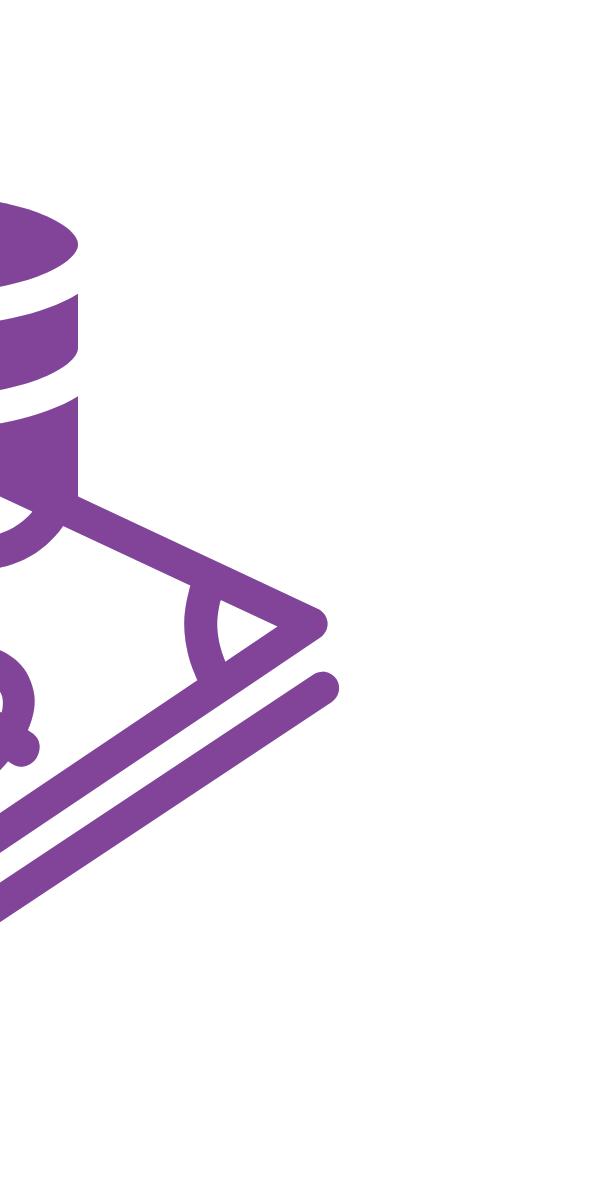

“Students are an invaluable part of Ontario’s economy and deserve support as they navigate post-secondary education amidst economic uncertainty and rising costs of living,” said Jessica Look, OUSA president and vice-president external a airs of the University Students’ Council, in a press release. “We are disappointed that the government has not prioritized this support in the new budget.”
OUSA said they were concerned to see no mention of Ontario Student Assistance Program funding in the provincial budget and to learn the province has underspent in the post-secondary sector of the past fiscal year.
OUSA has consistently advocated for OSAP policy changes, including extending the grace period to two years and eliminating academic probation. The advocacy body also urged for the province to increase operating grants to post-secondary institutions to balance the cost-sharing model, which in turn will o er relief for international students.
WORK PLACEMENT PROGRAMS AND FREE NURSING TUITION

The federal government acknowledged internships and co-ops play a critical role for transitioning post-secondary students into the workforce.
The federal budget proposed to provide $197 million to the Student Work Placement Program
USC to advocate for end of single-use plastic water bottles on campus
ADAM TAIMISH NEWS INTERN
The USC will advocate for the university to remove single-use plastic water bottles by the end of the summer after council unanimously voted to adopt the Western Blue Community proposal on March 22 — World Water Day.

The Council of Canadians — an Ottawa, Ont.based non-profit — created the Blue Communities Project in 2009. The project encourages communities to recognize water is a shared resource for all.
“Blue Communities indicate a commitment to the eventual removal of plastic water bottles within a given space,” said Lauren Jarman, University Students’ Council vice-president university a airs, in an email to the Gazette Jarman said the proposal aims for the school to ban or phase out the sale of bottled water in facilities and at events and promote publicly-financed, -owned and -operated water services. She also hopes Western University will eliminate single-use plastic water bottles when the contracts with their current vendors are up for renewal.
In 2021, the world manufactured roughly 600 billion plastic water bottles — enough bottles to reach the moon more than 300 times.
Though the university’s main campus is not yet a certified Blue Community, the City of London, as well as two of Western’s a liate colleges — Brescia University College in 2021 and Huron
in 2024-25 to continue creating work-integrated learning opportunities.
The Ontario government is expanding their Learn and Stay Grant — which provides free tuition and covers compulsory fees, books and other educational costs for nursing students in priority communities. The grant will now include paramedic and laboratory technologist programs in northern and southwestern Ontario.
Programs at Western University that are eligible for the Learn and Stay grant include the regular nursing program collaborative with Fanshawe College and compressed time frame nursing. Graduate nursing programs — the master of science in nursing and master of nursing primary health care nurse practitioner — are eligible, as well as the postgraduate primary health care nurse practitioner diploma.

Students who receive this grant will be required to work in the region where they studied. The service commitment would require Western students to work in London for a minimum of six months for every year of study funded by this grant.
Ontario is also investing part of $200 million in the next year to o er up to 6,000 health-care students training opportunities to work in hospitals and gain practical experience through the Enhanced Extern Program.
The province will also introduce new, threeyear applied degrees and additional four-year degree programs at publicly-assisted colleges — such as a bachelor of skilled trades in business management.
MORE MEDICAL TRAINING SPOTS
The provincial government believes there are not enough medical training seats, so they are investing an additional $33 million over three years to create 100 undergraduate and 154 postgraduate medical training seats. In 2022, the
Ontario government announced an expansion of 160 undergraduate and 295 postgraduate medical training seats — of which Western received 28 postgraduate medical positions.
Ontario is also investing a total of $80 million over three years, starting in 2023-24, to further expand nursing education in universities and colleges by increasing enrolment by 1,000 registered nurses, 500 registered practical nurses and 150 nurse practitioners seats. The province will add 52 new physician assistant training seats to reduce wait times and improve patient access.
To address the shortage of veterinarians in remote and northern communities, the federal government will launch a new collaborative doctor of veterinary medicine program with the University of Guelph and Lakehead University. This new program will allow an increase in enrolment by 20 new students per year.
FUNDING FOR POST-SECONDARY SCHOOLS
The provincial budget revealed $5.4 billion will be given in the post-secondary education sector, including over $2 billion in capital grants over the next 10 years. According to the provincial budget, this increase will help colleges, universities and Indigenous Institutes modernize classrooms by upgrading technology, carrying out repairs and improving environmental sustainability.
HOCO 2022 cost police over $265,000
ADSHAYAH SATHIASEELAN NEWS EDITOR
The London Police Service’s annual Internal Task Forces Report revealed policing Western’s Homecoming in September 2022 cost $265,155.
This is an increase of $9,057 from last year, which cost taxpayers $256,098.
Over HOCO weekend, London police issued 25 charges — 22 under the Liquor License Control Act and three charges under the criminal code. They also issued 34 fines and 178 warnings related to unsanctioned street parties on and near Broughdale Avenue.
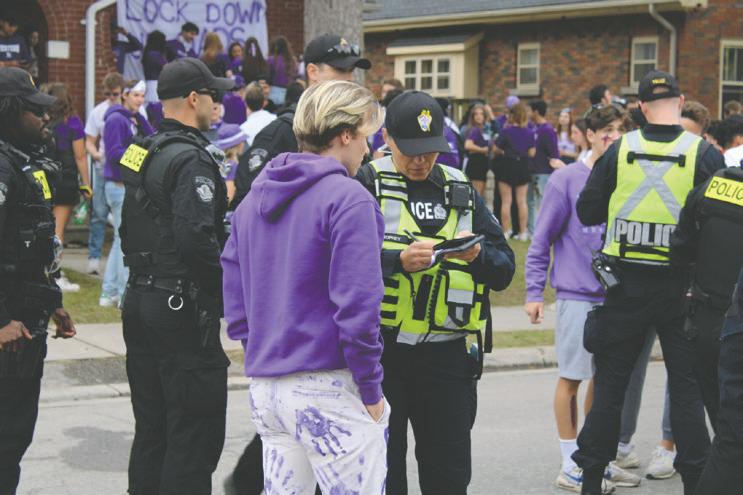
LPS chief Steve Williams condemned partiers’ “reckless acts” — including throwing beer cans at police o cers and others, damaging property and jumping from rooftops and hydro poles — that forced the closure of several roads, including Richmond Street “to ensure the safety of those in
of the area.”
The Middlesex-London Paramedic Service confirmed 28 people were hospitalized — six with serious injuries — related to unsanctioned street parties on Sept. 24, 2022. In 24 hours, paramedics responded to 76 total calls for HOCO-related incidents, beginning at 8 a.m.. Forty-eight patients were assessed and released on the scene.
“It is very fortunate that we did not see a more serious outcome to this event,” said Williams.
London’s Unsanctioned Party Task Force met frequently before Homecoming celebrations to prepare for possible unsanctioned street parties
on Broughdale Avenue. While the City of London was responsible for overseeing the task force, the group was composed of senior leaders from Western University, the University Students’ Council and the Middlesex-London Health Unit. First responders, including London Police Services, the London Fire Department and Middlesex-London EMS, were also task force members.
According to John Doerksen, Western’s vice-provost of students, the university has invested an average of $250,000 annually in additional security and health and safety measures to mitigate HOCO’s impact on the local community over the last five years.
The LPS board will receive the report Thursday.
NEWS | P5
MADELEINE MCCOLL GAZETTE A partier at a HOCO gathering speaks to a police o cer, Sept. 24, 2022.
University College in 2022 — have already been recognized as Blue Communities.
How profs are changing their courses for ChatGPT
SHREYA MENON NEWS INTERN
With all the buzz around students using ChatGPT to get their assignments done or help write exams, several faculty members have started planning how to adapt their courses for life with the AI tool.

ChatGPT is an artificial intelligence chatbot developed by OpenAI that is able to write simple essays, solve complicated equations and find errors in code immediately after a prompt is inputted.
Since the natural language model launched in November 2022, there is no academic policy prohibiting students from using the service. Western University professors have expressed concerns that the use of ChatGPT falls in line with academic dishonesty, but have found di erent ways to mitigate the challenges that come with it.
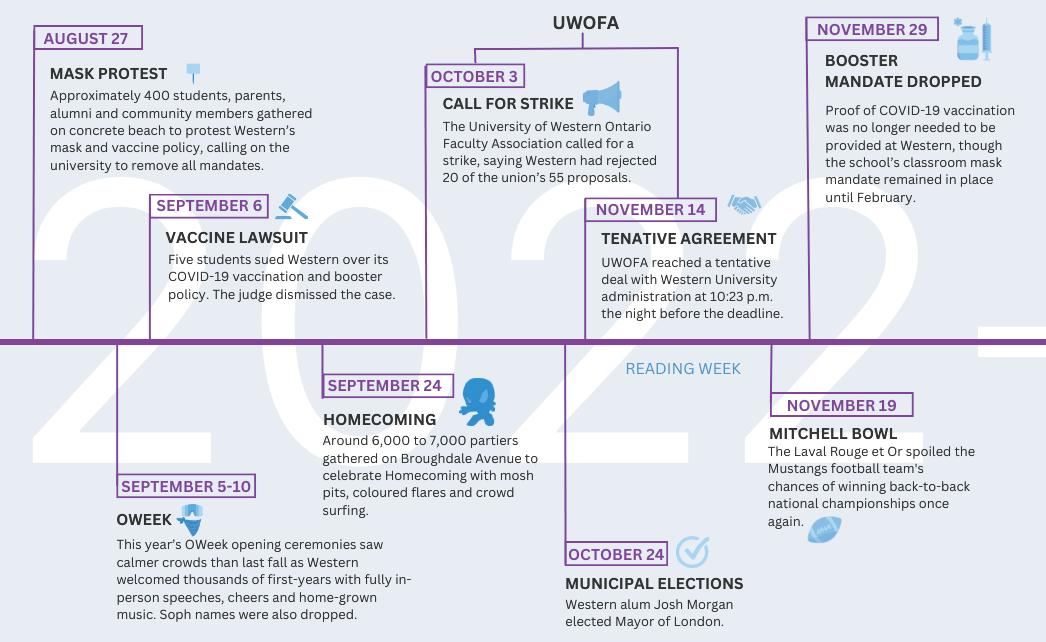



Western president Alan Shepard told the Gazette in an interview that he expects the software will ultimately change how professors assign work in courses where writing is the main assessment format.

Faculty of Information and Media Studies professor Thomas Streeter said he recently amended his syllabus to include that the use of ChatGPT for assignments would be considered a violation of academic integrity. Streeter said he has included a clause in his syllabus that reads he “reserves the right to use tools that can identify [ChatGPT].”
“I’m worried about it getting in the way of students’ learning, I’m less worried about students cheating,” said Streeter.
He also plans to keep exams hand-written and in-person for the same reasons.
Similar to Streeter’s views, Alyssa MacLean, an
assistant professor in the department of English and writing studies, believes students using the service are doing so “out of an act of desperation.”
MacLean is on a ChatGPT working group for the English department which provides their faculty with tools they could consider using and suggestions for best practices related to the use of ChatGPT — including if they wanted to use, ban or restrict ChatGPT in their classes.
“There’s a lot of faculty who feel like this is a tool that is overall not a great development pedagogically for our field,” said MacLean. “Our fac-
ulty wants to find ways to ensure that the work students are submitting is actually a product of their own thoughts.”
MacLean plans on re-thinking assignments to include more “in-between” steps such as an annotated bibliography, essay proposal and more in-class assignments over the take-home strategy to “ensure trust in the system.”
While she has been vocal about her stance on ChatGPT, MacLean said she will be more explicit about policies regarding penalizing students next school year since she explained it’s di cult to
change syllabi after the semester begins. While some professors plan to alter their course syllabi, others see no reason to do so and plan to use ChatGPT to their advantage.
Zheger Hassan, an assistant political science professor at Huron University College, said he has concerns about the chatbot encouraging academic dishonesty, but he wants students to understand how to e ectively use ChatGPT — especially in research.
“I want to maybe get students to use [ChatGPT] for an assignment to show them the benefits of it but also the drawbacks and issues that come with using such a platform,” Hassan said. “This way, [students] can learn about how they can use [ChatGPT] to assist them in doing their work rather than relying completely on it.”
Like Hassan, Ting Li, an assistant professor in the Information Systems group at the Ivey Business School, said she has concerns about trustworthiness, but will “also look towards the positive side” of using ChatGPT.
“It makes no sense to ban students from using ChatGPT … it saves time discussing basic concepts and directly talking about things that are creative,” Li explained.
Li also said professors “know what ChatGPT can o er,” so students who plan on using the system should not blatantly plagiarize, but instead use it as a tool to learn more e ectively. She plans to amend her syllabus in the long-run to explicitly state the ways students can use ChatGPT, but will not be doing so for the next school year.
Looking toward the future of academia, Li said she foresees major changes because of this new wave of AI.
“I may be biased, but yes. This is just the beginning,” she said.
SPORTS | P6
KATHERINE GUO GAZETTE
USC completes incoming 2023-24 executive team
SONIA PERSAUD NEWS EDITOR ADSHAYAH SATHIASEELAN NEWS EDITOR
The USC announced its newly-hired vice-presidents on March 24, completing the executive team for the 2023-24 school year with all-women VPs joining incoming president Sunday Ajak.
Meredith MacFarlane will be the University Students’ Council’s next vice-president orientation and programming, Bianca Gouveia will be vice-president student services and Tamsen Long will be vice-president communications and public a airs. They will work with elected incoming vice-president university a airs Maria Farooq and incoming vice-president external a airs Emily Poirier.
MacFarlane is a fourth-year sociology student who has been involved in Orientation Week during her time at Western University. As a twotime Social Science soph turned programming assistant, she applied for the role to give back to the community.
Her priorities include inclusivity and safety when planning Orientation Week and the USC’s programming, which includes events like Purple Fest. She said she enjoyed the soph leadership and general soph training she completed this year and will work to implement it again.
Council approved structural changes to the executive team last fall, which included the transition of the vice-president student support and programming position to MacFarlane’s role as VP orientation and programming. The name change reflected the importance of orientation and moved the responsibilities of student supports like the food bank to another new role — VP student services.
Gouveia will take on the VP student services role. As a peer support volunteer, VP remote of
peer support services and early outreach leadership developer, her experience in these areas all fall under the portfolio she will oversee next year.


Gouveia said she and Ajak have met to discuss some projects they are hoping to work on once their term starts.
“After looking at [Ajak]’s campaign and what he was running for, it made me even more excited,” said Gouveia. “I just knew that I’d be able to contribute to his campaign goals and accomplish everything that he wants this year.”

Long, the incoming VP communications, is a fifth-year student studying women's studies, history and political science. As a Saugeen-Maitland Hall residence soph and Spoke employee, she has been involved in various campus roles. Long is currently serving as the USC’s associate VP public a airs — part of the communications team.
One of her priorities is to continue engaging students beyond USC election season.
“A bunch of students got tuned into the USC, so I want to make sure that we keep that up throughout the year,” said Long. “I’m really excited to
work with [Ajak] and get started with the team.”
The USC’s incoming VP university a airs, Farooq, and VP external a airs, Poirier, were voted in by council members at their March 8 meeting.
Farooq is a fourth-year nursing student and nursing councillor on the USC and the Western-Fanshawe Nursing Student Association. She currently sits on the USC’s University A airs Standing Committee. Outside of council, she has worked part-time at the Spoke for four years and volunteered at the Peer Support Centre and as an international peer guide.
In her role as VP university a airs, Farooq’s first priority will be to foster safety on campus. Her other priorities include USC outreach, transparency and mental health accessibility.
Poirier is a fourth-year global health and refugee and migrant studies student at Huron University College, and the current vice-president student a airs on the Huron University College Students’ Council.

She is a student council veteran, having previously served as a department representative
and assistant VP student a airs on Huron’s student council. Poirier is also a two-time Ontario Undergraduate Student Alliance delegate and is a co-founder of the Safe Campus Coalition, which organized Western University’s anti-gender-based and sexual violence walkout in September 2021.
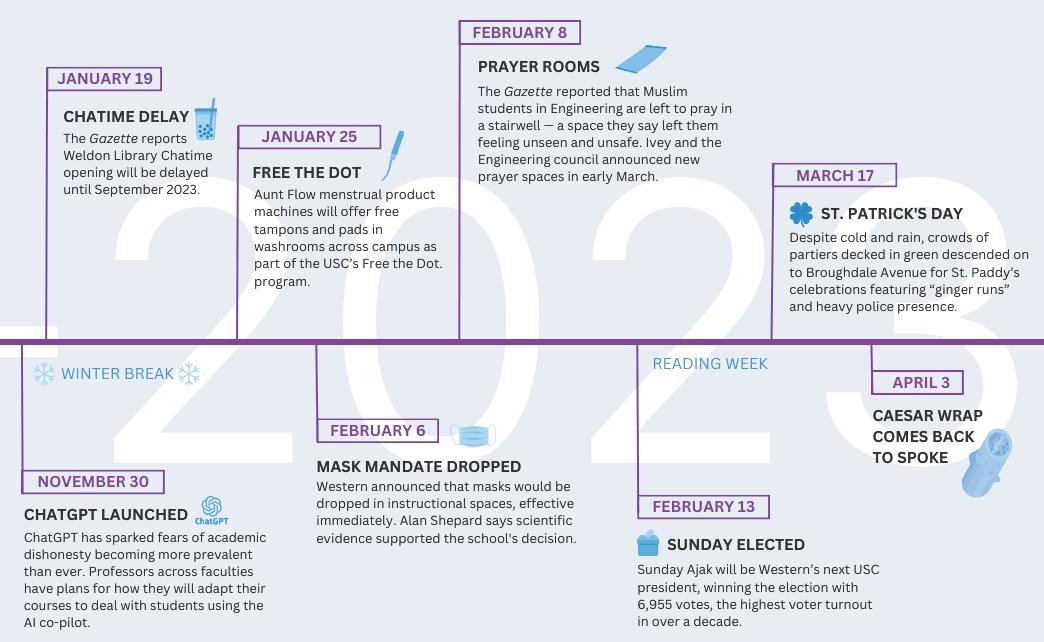
Poirier hopes to advocate for more grants for the USC’s Food Support Services, and work towards increasing a ordable housing in London and removing the provincial student loan interest rate.
As incoming USC president, Ajak said he is “really excited” to work with his incoming executive team. Ajak said he feels having an all-women VP team is “wonderful for representation on campus.”
“They all are such strong candidates and they have such strong leadership behind them,” said Ajak. “I know that USC is in for a big change — for some big thoughts, some big ideas.”
NEWS | P7
REBECCA STREEF GAZETTE
Opinion: Honestly, graduating sucks
 BIANCA COLLIA COORDINATING EDITOR
BIANCA COLLIA COORDINATING EDITOR



The last thing I expected to be asked about when getting my nails done is if I’m getting engaged — just because I’m graduating university.
It’s hard to know what life has planned for you once you graduate. Your whole life until that point has been planned out for you — from elementary school, to high school and for some, a post-secondary education — but now what?
As graduates plan to leave university, it feels like a societal expectation has been placed on us to go out into the real world. It can feel like that means we need to find full-time jobs, start looking for serious relationships and consider what we actually want to do for the rest of our lives.
The issue with this is, what is the real world?
As a fourth-year student graduating this upcoming June, I spent the past couple of years working and surviving university full-time. I took on bigger responsibilities in my personal life, made lasting connections and learned a lot about myself.
But does that mean I’m ready to settle down, in a career or relationship? Fuck no.
I’ll be 21-years-old when I graduate this summer and I’d be lying if I said I have any indication of what I plan to do. When people ask me what my big plans are after grad, I use the same line over and over again.
“I’m going to travel.”
Although I do have a few trips booked and some online shopping orders placed, I don’t really mean exploring other countries — I mean finding myself.
University has been a great experience and definitely taught me more about who I am and what I value. But it hasn’t really set me up for the rest of my life. As a matter of fact, it actually changed my career path, if anything. I entered my undergraduate knowing exactly what job I wanted, in what sector and at what company. But now it’s all a blur.
You could argue that this is what your 20s are supposed to be — trying new things, discovering what you do and don’t like. But graduation doesn’t carry the same excitement that society perceives it to.
This is where your life is really about to begin. And it’s scary.
Of course, it’s exciting to know I’ll never have to sit through a three-hour 9:30 a.m. lecture again, and I definitely won’t miss submitting 2,500-word papers on a Sunday at midnight.
But graduating feels like driving into a dark tunnel.
You were taught how to drive, equipped with the right tools like car headlights and you know there’s light at the end of it. It just doesn’t feel like there is because you can’t see it quite yet. Who knows what’s in store for your future? Who knows where the tunnel actually leads?
The worst part isn’t that nobody really knows what they want to do with the rest of their life. It’s the fact nobody wants to admit.

I’ve heard these sentiments carried throughout other graduating students. Some are going back to school, others have jobs lined up that they aren’t sure about and others are taking the year o — to figure their stu out.
I may not know what I want to do in my life, and I may still be trying to find my purpose. But one day, I'll look at graduation as the first step I took in discovering who I am and what I want. But that day hasn’t come yet. For now, graduating just sucks.
EDITORIAL
It may be cheating, but using ChatGPT shouldn’t be wrong
Ifyou need to quickly understand a di erential equation or summarize a 40-page reading, using ChatGPT as an educational tool shouldn’t only be permitted, but encouraged.
But using it substantially to complete an essay, exam or other assessment falls into a grey area: it should be considered cheating, but begs the question, why are we being graded on work that can be completed by a robot in the first place?
ChatGPT is a state-of-the-art natural language model that uses artificial intelligence to generate human-like responses based on user inputs and the patterns and biases created from its training data.
Since ChatGPT is so new, there is no established procedure in dealing with the academic advantages that can come with using it. According to Western university professor and chief digital information officer Mark Daley, utilizing ChatGPT on assessments technically isn’t cheating.
However, it should be.
Forgetting about technicalities, attaining a degree is supposed to be academically challenging and merited based on your own work. Using ChatGPT on assessments it wasn’t designed to be used on circumvents these goals.
Imagine if your future doctor, engineer, lawyer or teacher relied on ChatGPT throughout their academic career to pass exams designed to be taken without its use. Suddenly, the seemingly trivial act of utilizing ChatGPT to lessen the burden of your academic responsibilities takes a whole new meaning.
Academic dishonesty undermines the integrity of the education system and the value of attaining a degree, in part because it allows individuals who are more willing to break the rules to have an unfair advantage.
ChatGPT itself is i y on whether its use violates the principle of academic integrity of its use.
When prompted, the AI said that “using ChatGPT to substantially complete a school assignment can be considered a violation of the principle of academic in-
tegrity if the student does not acknowledge the use of the AI tool in their work. Academic integrity requires students to be honest and responsible in their academic pursuits, and to properly attribute any outside sources used in their work. Failing to do so could be seen as plagiarism and misrepresentation of one's own abilities, which undermines the value and credibility of academic achievement. However, using ChatGPT as a tool for research and inspiration, while properly citing any relevant information, could be seen as a legitimate way to enhance one's understanding and skills.”
Relying on ChatGPT without professor permission to substantially help with your academic career fits the definition of cheating.
However, it doesn’t make sense to ban the use of a new revolutionary technology that can improve student performance beyond the classroom. Instead, universities should be designing assessments that harness ChatGPT’s power.
The onus is on instructors and institutions to strive for educational reform — creating assessments that require the type of critical thinking that ChatGPT can’t provide — rather than on the students. After all, if attaining a degree today can be done by a mere robot and requires the simple regurgitation of pre-existing works, then this suggests underlying issues with the education system.
Technologies such as ChatGPT will continue to integrate into the ever-evolving world. Instead of penalizing students for using innovative resources, the education system should implement these technologies as part of the learning process. This change will help the education system better reflect how students will be asked to apply their learning into the real-world, where they will be able to use technology like ChatGPT.
Only then can students receive the education they deserve and the knowledge they need to succeed in the future.
Your move, Western.
Editorials are decided by a majority of the editorial board, and are written by a member of the editorial board but are not necessarily the expressed opinion of each editorial board member. All other opinions are strcitly those of the author and do not necessarily reflect the opinions of the Gazette, its editors, or staff. To submit a letter to the editor, send an email to opinions@westerngazette.ca

Opinion: Summertime courses feel like a vacation
ADSHAYAH SATHIASEELAN NEWS EDITOR

Most students spend their summers lying under the sun at the beach or hustling for some money at their seasonal internship. I have also spent my summers doing these activities, but also taken at least one summer term course every year I’ve been a Western student.
Honestly, I’ve never felt so relaxed while being in school.
Last summer, I took four courses while managing a job and having a

social life. Perhaps, this is the reason why I enjoy taking summer courses so much. Since most of my courses were asynchronous, the flexibility of watching lectures, studying and writing a take-home exam in the comfort of my childhood bedroom and on my own time brought me pure joy.
Professors in summer courses have always seemed more understanding that students are working and not necessarily able to prioritize school. Having the flexibility to write an exam during a 12 to 24 hour window and have my request for an extension for an assignment granted almost immediately definitely made these courses some of my favourite ones at Western university.
I have never had more than two or three courses overlap at any given time, because of how sessions are scheduled from May to August. Distance studies and summer evening classes can both run from six to 12 weeks and start either in May or mid-June. The other two session types, Summer Day and Intersession, can run from three to six weeks, and can start at various dates between May and July.
While the accelerated nature of these courses make it seem harder to keep up with the material, I have found that is not quite the case. Professors who teach the same course in the Fall or Winter terms often scale down their material, and choose the most important chapters to teach in the summer
term. This leads to less material being tested on exams, and makes studying a lot easier. This is especially advantageous if you take a notoriously hard course over the summer.
I have taken summer courses for multiple reasons, the simplest being for pure interest. There are so many interesting courses that I did not have the capacity to take in the school year due to progression requirements and scheduling conflicts. This made summer the perfect time to gain insight into topics I was interested in, outside of my degree.
Taking a summer course isn’t for everyone. For some students, the added tuition and textbook costs just aren’t worth it.
To help mitigate this, Western continues to o er financial aid in the form of bursaries and work-study in the Summer term. Students can also apply to OSAP under a part-time or full-time application depending on their course load. Tuition is charged on a per-course basis — at the same rate students pay during the school year — with the addition of ancillary fees.
Take it from someone who has taken six summer courses over the last two summers and received some of the best grades on my transcript: this isn’t a bad way to spend some money.
Summer courses provide a change of scenery and there’s potential to explore new things. There’s plenty of value to taking them, even if it isn’t as flashy as other summer options.
OPINION | P8
Opinion: London’s cafe scene o ers something for everyone
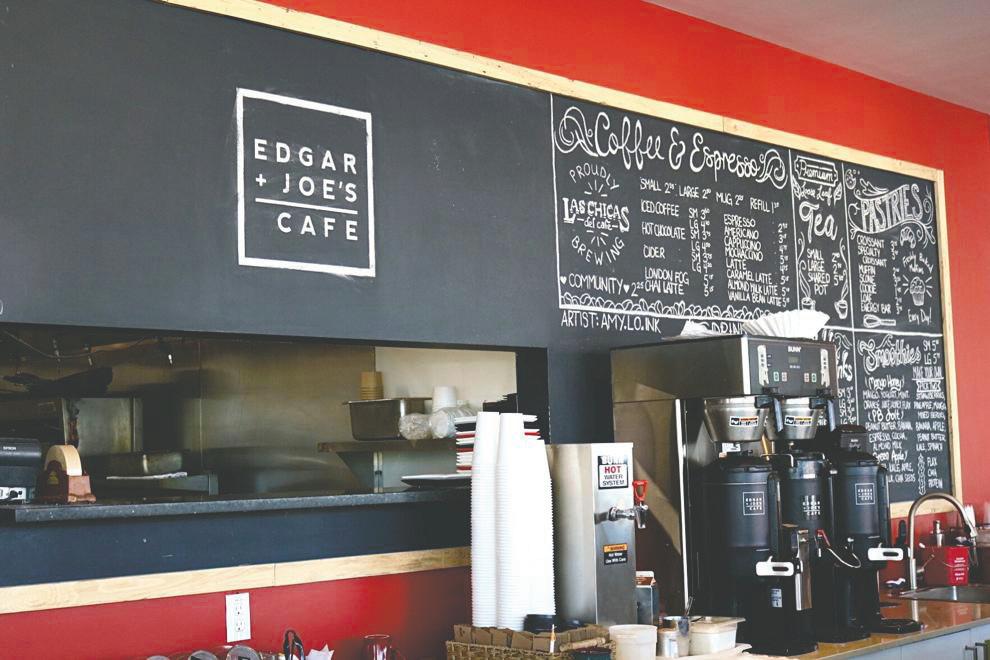 LAUREN MEDEIROS CULTURE EDITOR
LAUREN MEDEIROS CULTURE EDITOR
Iamconfident that London has a cafe for everyone.
Visiting nine di erent cafes across the city has allowed me to see more of London than I ever have, try delicious food and drinks, as well as meet people with unbelievable amounts of passion and spirit for their work.
I wanted other students to read my reviews as a light source of entertainment, and hoped my recommendations would encourage them to venture beyond campus, support local businesses and connect with people in the community, just as I did.

Here is a more concise rundown of what you can expect at each of the cafes I visited, along with some insider tips and my reflections after the fact.


I began at Black Walnut, home of the “cruffin” and, in my opinion, the best black co ee and latte in London. The cafe is perfect if you want to catch up with a friend or meet with a group for an assignment in a homey setting alongside a handmade treat. That being said, I’ll admit Black Walnut is not the best place to cram a last minute paper. With no wifi and a constant buzz of conversations, it may be hard to focus for some.
SAGA was my second stop on the hopping journey, a board game cafe that o ers paninis, snacks and an impressive cocktail menu. The biggest selling factor is not the cafe’s menu, but rather the unique interactive element of playing games like Battleship and UNO in good company. SAGA is the ideal date night spot or for a girls night out.
As one of the five social enterprises of Youth Opportunities Unlimited, an organization which trains in-need youth in the community to build employable skills, YOU Made It is the place to be if you want your daily ca eine intake to have a positive community impact. Its New York-style deli vibe is not the most comfortable to pull out your laptop and do work, but it does have decently quiet music and plenty of tables.
If you want a donut, look no further than Commonwealth. Delivered fresh to their downtown location every morning, the hand-cut and hand-decorated artisanal donuts are a rarity in London. It’s worth showing up at 9 a.m. to get the best selection. The location is super bright and energizing — a nice change of scenery to the dimly lit Weldon Library.

When I think of Locomotive Espresso, I get a warm, cozy feeling. Operating out of a beautiful brick house, being inside of Locomotive is like being inside someone's quaint cottage. The cafe o ers an espresso shot with chocolate undertones that is just as tasty as it is as e ective as a morning pick-me-up. I’d recommend Locomotive if you’re feeling a little home-sick and want to unplug from your studies, with its laptop free tables.
If you’re convinced that pastries can’t bring you tears of joy, you’ll be proved wrong at Happiness Cafe. I wish, more than anything, that I could relive my experience eating a croissant there for the first time. I know it may be hard to believe that you can find a croissant that good in London, but please, do yourself a favour and make the trek to Wellington St. to experience it for yourself. If you’re a fellow advocate of having dessert for breakfast, I promise their glass case full of sweet treats will not disappoint.
London Bicycle Cafe was next and probably the most out-of-the-ordinary. It’s not everyday when you’re greeted by a bunch of cycling equipment while walking into a cafe, but that’s exactly why London Bicycle Cafe is so charming. As a community hub for avid cyclists and a repair shop, London Bicycle Cafe is the ideal place to fuel up
on some carbs during a long bike ride with a fresh bagel or pastry, get your bike fixed in record time, or even just to sit back and enjoy a co ee while you satisfy your curiosity for this hidden gem.
The multi-coloured walls and electric energy of Reset Social Cafe pairs perfectly with their flavour-packed food and juices. If you’re interested in clean eating, Reset should be your go-to lunch spot for salads, bowls and sandwiches made in-house. There’s no seating time limit – which makes the location awesome for day-long study sessions – but also means that most of the tables tend to fill up. If you’re going to vist, go on a weekday morning for better luck.

This brings me to Edgar and Joe’s, my final spot on the cafe hop and a perfect ending to the series, given it significantly stands out from the rest. It has a similar mission to YOU Made It, but instead o ering training to those of all ages rather than just youth through their six-week “Hands on Hospitality” program. The employees at Edgar and Joe’s provided some of the most friendly service I’ve experienced, and my exchanges with them were ones I will remember for a long time to come.
Although I have always loved sipping on a coffee and enjoying the scenery at a cafe, I have come to realize that they are often more than just what meets the eye. They operate as a place of gathering with their own unique feel, as well as emphasize a sense of community through their di erent yet incredible background stories.
There are still a few cafes in London I’ve yet to try, so take this as your sign to do a cafe hop of your own and let me know your verdict.
It’s not you, it’s everyone: Battling imposter syndrome
TAYLA DOYLE CONTRIBUTOR
MAYA LOUBANI CULTURE INTERN
If you ever feel like you’re not smart enough to be here, you’re not alone.
Imposter syndrome — doubting your abilities and feeling like a fraud — is a phenomenon most people will experience at one point or another. In a competitive academic setting like university, experts say these feelings can be heightened.
Sophie Crow, a fourth-year Western University kinesiology student, is no stranger to imposter syndrome. It’s a feeling that has been exacerbated now due to her impending graduation date and her graduate school applications.

“I feel like I’m not deserving, even though I know I’m a competitive candidate for grad school,” she says. “It’s easy to forget the uniqueness within yourself.”
Crow says her feelings of imposter syndrome are often enhanced by social media, especially LinkedIn, where it can be intimidating seeing everyone’s career and academic accomplishments.
“It’s hard to remember that you’re presenting yourself in the best light, but so is everyone else,” Crow says. “It’s not easy to stop yourself from comparing your achievements to theirs.”
Taylor Pratt, a clinical psychology master’s student, completed her undergraduate thesis on imposter syndrome at Brescia University College. She says that imposter syndrome is often found in high-achieving individuals when they enter a new environment.
“When you’re entering a new job, or graduating high school and going to university, there is a demand to perform which can lead to major feelings of self-doubt,” says Pratt.
Though a lot of research has been done on imposter syndrome and high-achieving professionals, Pratt found there was a lack of research on undergraduate students — despite it being a time
of extreme change.
“Undergraduate students are emerging adults — they are transitioning to a high stress environment and can feel like a small fish in a big pond,” Pratt says. “I surveyed 48 females at Brescia [in my undergrad], and every single person said they have had feelings of imposter syndrome at one point.”
Marnie Wedlake, a registered psychotherapist and assistant professor in health studies, adds that she believes university settings can be a breeding ground for imposter syndrome.
“A professor I used to have during my PhD always used to tell us, ‘academia eats its young,’ no matter if you’re an undergraduate student, master’s student, postdoctoral candidate or a tenure-track faculty,” she says. “It’s a highly competitive environment. They’re always asking what you’ve got on your CV, or how you’re performing compared to your colleagues.”
But these feelings don’t have to last forever — there are ways to break the cycle.
According to Pratt, creating an understanding environment where students feel comfortable openly discussing their feelings of inadequacy and doubt can help combat these isolating experiences.
“For a lot of people, when they experience this feeling, they think they’re alone, but that’s really not true,” Pratt says. “It’s really important to talk about because so many other people are experiencing this too.”
Wedlake agrees that we must openly talk about our insecurities in order to “beat” imposter syndrome.
“I think we would find comfort in the fact there are so many other people around us who are also trying to find their way,” Wedlake says. “We are all just trying to find a sense of belonging and talking about it will remind us that we actually do belong here.”
CULTURE | P9
LAUREN MEDEIROS GAZETTE
The chalkboard menu at Edgar and Joe's, March 20, 2023.
LAUREN MEDEIROS GAZETTE
The brightly coloured, geometric paintwork on Reset's stone walls, Mar. 3, 2023.
LAUREN MEDEIROS GAZETTE The matcha oat latte paired with a banana loaf at Locomotive Espresso, Nov. 21, 2022.
LAUREN MEDEIROS GAZETTE The order counter at CommonWealth, Nov. 10, 2022.
LAUREN MEDEIROS GAZETTE The front counter of Black Walnut, Sept. 21, 2022.
Nickelback and stopwatches: How Mustang goalies fight gameday stress
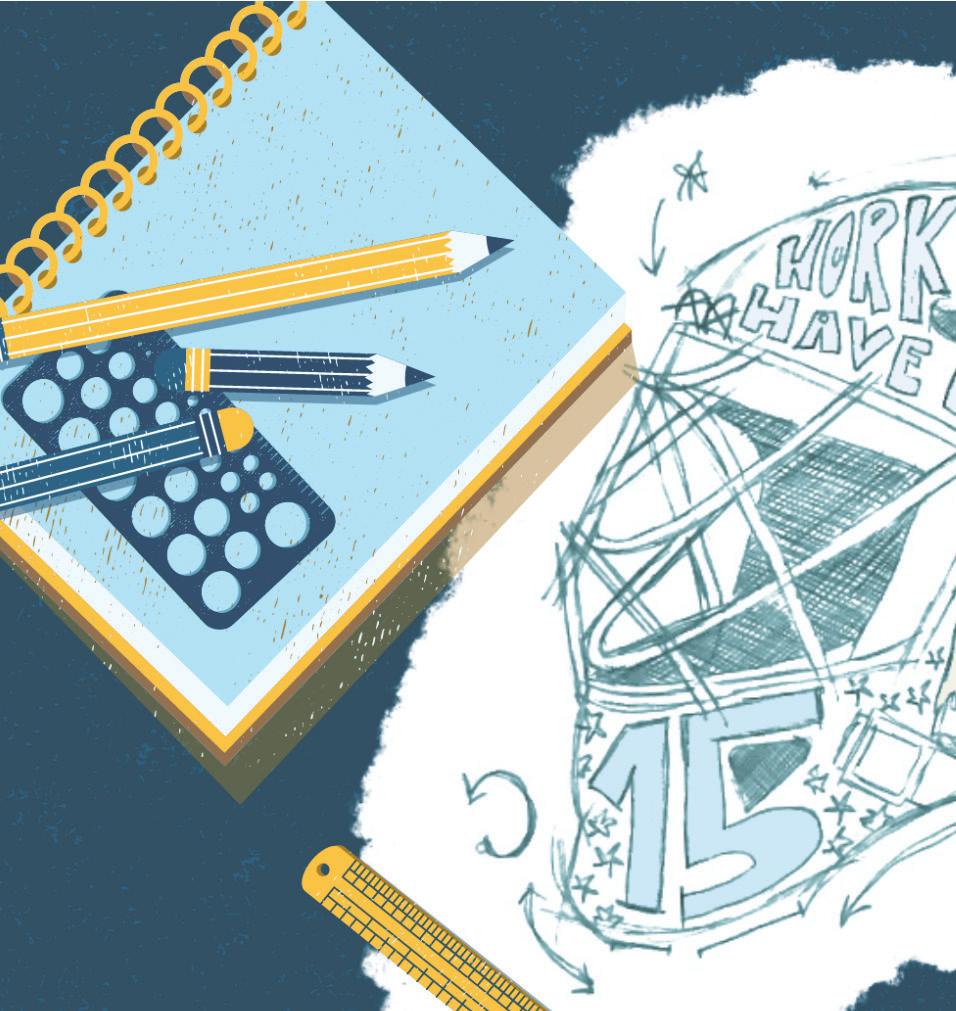 KIERAN DROVER SPORTS EDITOR
KIERAN DROVER SPORTS EDITOR


While the Mustangs women’s hockey team prepares to take the ice, fourth-year goaltender Kaitlyn Booth sits in the locker room, waiting for her moment.
After dominating the Ontario University Athletics over the past two seasons, you’d expect that Booth is focused on stopping pucks — but following her watch’s digital clock is one of the most important keys to her gameday.
Yes, pre-game rituals and superstitions are part of her game.
“I don’t get dressed until 15 minutes before on-ice warmup,” says Booth. “If we finish o -ice warm ups 40 minutes before and I have to sit in the dressing room for 20 minutes … I will literally look at my watch and I will not get dressed until 15 minutes before.”
While every athlete has their routines, goalies have a reputation for having their own quirky habits. After all, there aren't many athletes who have human conversations with painted red metal posts.
But for an incredibly mentally demanding position, it’s important for most goalies to enter their own world of focus before settling in between the pipes. As the last line of defence, it’s often the goaltender taking ownership for a team’s struggles. To the casual fan, it’s these masked menaces who appear to be the reason for every loss.
Third-year Mustangs men’s hockey goaltender Dylan Myskiw has learned valuable lessons from his experience as a goalie — particularly the pressure of having all eyes on him.
“It’s definitely one of those [positions] where you’re in the spotlight. There’s only one of you out there and you’re battling against the other guy,” explains Myskiw.
Regardless of the pressure, Myskiw believes he’s unique among goalies for not having strict pre-game rituals. He says rather than buying
into superstitions, he puts together a consistent routine.
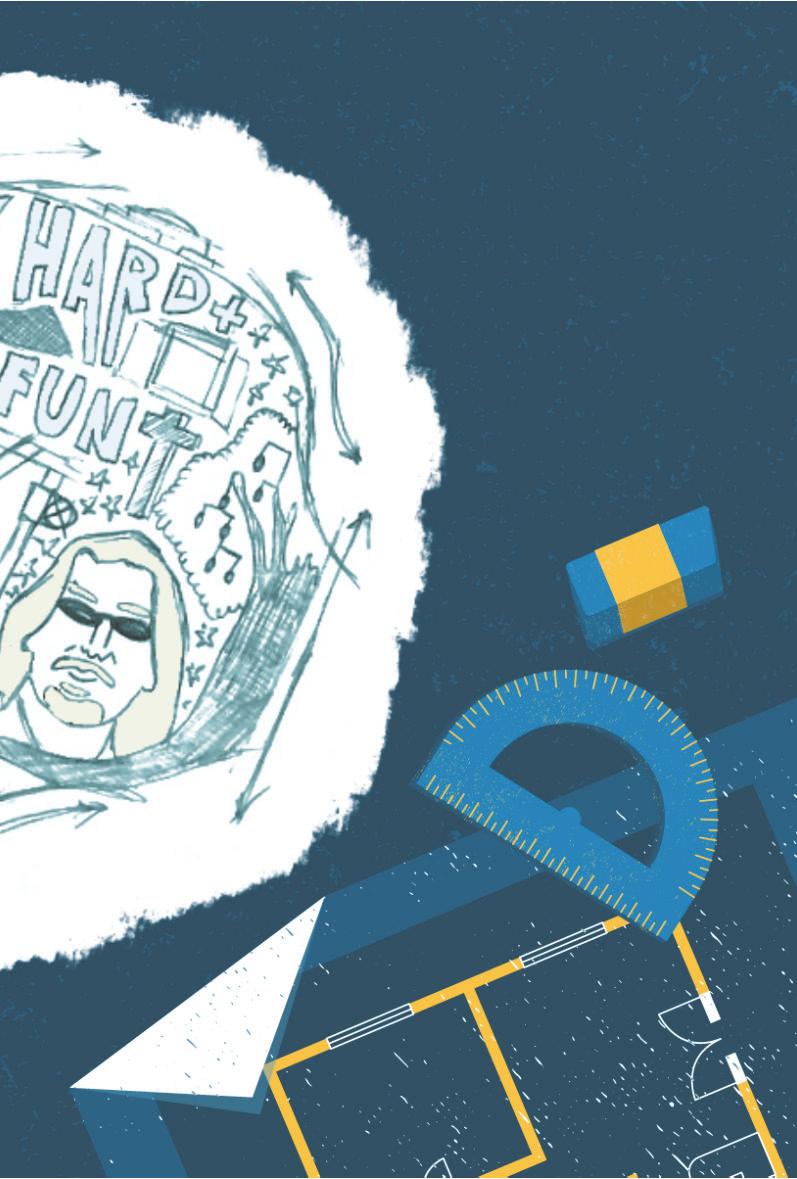
“If you watch me, it’s always going to be the same,” he says. “I do put on my right [equipment] first but it’s not because I think I’m going to play better this way, it’s just that everything has come to being routine and easy, where I’m not thinking and I’m just kind of doing.”
Myskiw believes the best remedy to stress is staying out of his head. In his case, that strategy features Chad Kroeger, the lead singer of Nickelback and Myskiw’s pregame anthem: “Animals.”
“I just kinda sit back and do my own thing,” he says. “I’m not going to sit with my head down the whole time.”
Booth echoes that her pre-game routines and attitudes are key to performance on the ice.
“I like to make jokes with my teammates before the game, to keep things light,” she says.
“When I go into the game with a loose mindset, that’s when I play my best.”
A goalie’s stress is inevitable, and all of them deal with that stress di erently — there’s no one size fits all strategy.

According to Mustangs women's goaltending coach Eric Rogers, the most important part of a goalie’s mentality is their reaction to making mistakes — like letting in the early goal.
Patrick Roy, one of the greatest goaltenders in National Hockey League history, only recorded 66 shutouts in his 1,003 games starting for the Montreal Canadiens and Colorado Avalanche. The point is that goalies are rarely perfect and as a result, they have to strug-
gle through multiple goals against on most nights.
For Rogers, this means goaltending is about perseverance, and he stresses this to his student athletes with one word — battle.
“If your mind’s racing or you’re worrying about your routine being o , just try and battle,” explains Rogers. “Most of them have the instincts and if they can just stop overthinking, they can just do it naturally.”
Today, hockey coaches are looking for goalies who can keep a level-head. After admittedly being too emotional in his own playing days, Rogers has instilled a “business as usual” mentality into the goaltenders he mentors today.
“I’m sure a lot of coaches would agree that most coaches want a calm goalie in the net,” he says. “They let in a goal, whatever, they move on. They make a huge save, whatever, they’re not pumped up, showboating.”

“They’re just business as usual.”
While Rogers suggested a number of strategies to succeed in the blue paint, he acknowledges every goaltender’s personality is di erent.
Even between the two starting goaltenders for
the Mustangs, both have di erent perspectives on coping with the limelight. From their play style to their pre-games, each of them forges their own identity between the pipes.
Kenneth West shatters U Sports triple jump record, overcomes long season of injuries
MASON LYN SPORTS INTERN
Mustangs triple jumper Kenneth West won gold and shattered the U Sports triple jump record at the national championships in Saskatoon, SK on March 11.
West jumped 16.24 metres, breaking the previous U Sports triple jump record of 15.81 by 43 centimetres — a number that stood for 10 years after former University of Sherbrooke student-athlete Olivier Huet set it in 2013.
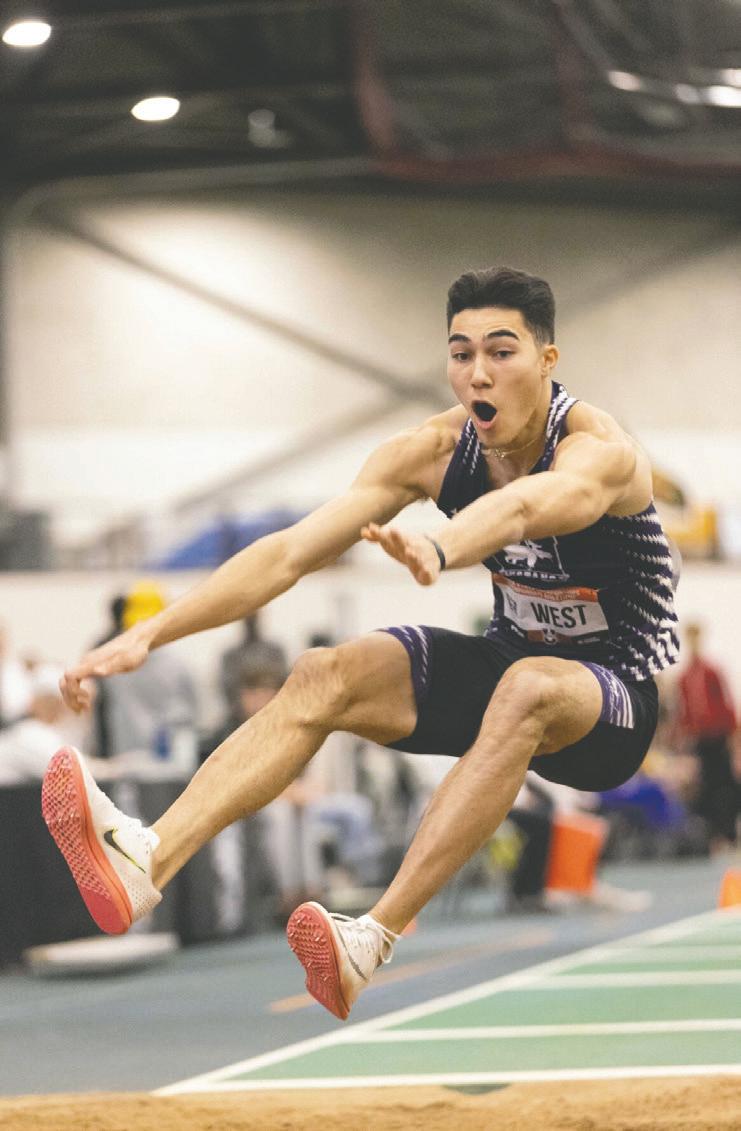
West broke the record on his first attempt in the event, beating his personal best by over 80 centimetres.
“I don't want to sound cocky, but I knew it was pretty close already,” said West. “I knew I had to keep on working out and then, who knows? Eventually, it would come right, but I didn't expect this to happen in my second year of competition. It's an honour to be on top of there — part of the history books.”
West also competed in long jump the day before, placing fourth. Western University’s track and field team finished with team silver medals by the end of the championships.
West’s gold medal came o the heels of him breaking the Mustangs record and winning a silver medal in triple jump at the Ontario University Athletics championship in February.
On the surface, it seemed everything went

right for the third-year science student this season. But the truth is, this wasn’t an easy year for him.
West sprained his left ankle in September 2022 playing intramural volleyball and was ruled out for five weeks — making him inactive during the track and field preseason. While the injury hampered his opportunity to train with the rest of his teammates, West still prepared for the season with a series of non-strenuous exercises.
That’s when disaster stuck again.
West su ered another injury, this time to a ligament in his right foot — he couldn’t even jump. But neither injury stopped him from keeping his spirits high.
“I've always been a pretty optimistic person,” said West. “I know that things may not always go your way.”
Caroline Ehrhardt, Mustangs horizontal jump coach and U Sports women’s triple jump record-holder, tipped her cap to West’s positive attitude.
“That injury definitely made things very challenging for us, but Kenneth was extremely adaptable,” said Ehrhardt. “He was honestly just happy to do anything, even if it was Plan A, B, C, D — he didn't care, he was just happy to be doing something.”
West’s luck changed when he was healthy enough to be cleared to participate in two track and field meets before the OUA championship.
At these meets, West learned to adapt to his injuries.
“I was able to learn a lot about my foot and how to work with it,” he said.
From there, West was ready to compete at the OUA championships in Windsor, Ont., where he won the silver and set a triple jump Mustangs record.
Two weeks later, he would shatter the decade-long record — a long time in the making, according to West and Ehrhardt. His coach is convinced he has unfinished business.
“It's pretty scary to me to think about what this kid can do when he's actually able to triple jump in practice,” Ehrhardt said. “We got to a point where we were just doing the bare minimum throughout the week, in terms of sprinting and weightlifting, and doing hops on his opposite side.”
“I don't think that this was the last time the U Sports record will be broken by him. That's for sure.”
While West plans to write his MCAT exam to qualify for medical school, he hopes to continue his athletic career and qualify for the 2023 Pan American Games to represent Canada in Santiago, Chile.
Looking ahead to next season, he has a central goal in mind.
“I just honestly want to push that U Sports record as far as I can.”

SPORTS | P10
COURTESY OF KENNETH WEST
Western Mustang Kenneth West jumps at U Sports National Championship in Saskatoon, SK, March 11, 2023.
MONIQUE FLEMMING GAZETTE the
How performance anxiety a ects student-athletes
MILES BOLTON SPORTS EDITOR
As she tried to collect herself in the bathroom stall of Alumni Hall, Lauren Pastor realized one thing: she was not going back to volleyball practice.
She’d struggled with performance anxiety throughout her athletic career. Even before she arrived at Western University, it a ected her academics and social life.
The anxiety would often hit her on the volleyball court, but she was able to manage it with therapy.
“There were a few incidents where I would have panic attacks on the court,” Pastor says. “I'd be crying, I would feel very burned out and was highly anxious about my performance and meeting a standard that I would set for myself.”
The former third-year Mustangs setter played for Team Ontario and captained Team Canada’s youth volleyball team in high school, eventually being recruited to Western’s top-ranked women’s volleyball program.

The expectations she put on herself were high.
Pastor became a captain for the Mustangs, a U Sports Academic All-Canadian, an Ontario University Athletics all-rookie team honouree and a conference second-team all-star. She was elected Mustangs Athlete Student Council president for the 2022-23 season and was previously a Student Athlete Mental Health Initiative co-lead.
She did all this while pursuing a dual degree at the Ivey Business School and in health sciences.
Her resume stands out among her peers, but in the middle of practice on that day in November 2022, things reached a turning point.
“I felt this wave of overwhelming pressure, sadness and emotional instability,” Pastor recalls. “I was on the verge of tears, my heart was beating fast.”
A student trainer and a teammate went to check on her, but Pastor refused to go back to the court. She sat on the sidelines for the rest of practice, eventually leaving Alumni Hall without saying a word.
Just hours later, she called her head coach, Melissa Bartlett, and the two agreed she should take a break.
Pastor was formally diagnosed with depression shortly after. She began taking medication and attending weekly therapy, before making a decision many athletes dread making: stepping away from her sport for good.
“I decided my time was up because I couldn't imagine going back into a competitive training environment again,” she says.
Her story, sadly, isn’t unique.
According to a 2019 study on psychological distress of Canadian university student-athletes, 20 per cent of participants experienced levels of anxiety and depression that met the criteria for severe mental illness, significantly higher than other students.


Natascha Wesch, an assistant professor in Western’s Faculty of Health Science, says the challenges student-athletes face, academically and athletically, contribute to overwhelming feelings.
James Bull says he feels performance anxiety and time management-related stress are common among student-athletes.
Bull, a fourth-year kinesiology student, says student-athletes face increased barriers compared to normal students to maintain positive mental health. A full course load and a schedule that has up to six practices a week limits an athlete’s time to focus on school.
“[The workload] tends to lead to a huge source of stress and anxiety for students because they don't exactly know when they're going to get things done,” Bull explains. “Or, they know there's deadlines coming up that they might not be able to reach and that tends to lead to a lot of issues.”
Even National Football League cornerback Richard Sherman discussed the struggles student-athletes face — talking about his own experiences as a Stanford University student-athlete. Sherman echoed the sentiment Bull expressed about balancing a relentless schedule.
focus on,” says Blagojevic. “Sometimes, you're brought to the decision that you have to give something up and deciding what you need to give up is really di cult.”
On the field, Blagojevic explains her performance anxiety symptoms are similar to what Pastor experienced — nervousness followed by a racing heartbeat. O the field, she says balancing the heavy schedule can be overwhelming.
“I struggle to focus on what I'm supposed to do on the field,” she says. “When I get in my own head, I just mess up really easy passes or things that I'd be able to do in ordinary circumstances. The easiest stu becomes a lot more di cult.”
Pastor and Bull have both held roles on MASC and the Student Athlete Mental Health Initiative — groups focused on student-athlete mental wellness — during their time at Western. When the two took over SAMHI as co-leads last year, they wanted the team to focus on common problems student-athletes face.
“You've got two overlapping, highly-demanding situations that student-athletes have to balance and manage,” Wesch explains. “They don't have a choice as to ‘today I'm focusing on sport and I'm putting aside being a student,’ or ‘today I'm focusing on being a student and putting aside sport.’ Those things happen concurrently.”
Wesch, a former athlete herself, was the Mustangs women’s rugby head coach from 1994 to 2016 and runs a private practice in mental performance and mental health for athletes.
According to Wesch, everyone’s mental health fluctuates on a spectrum. While athletes can experience the same mental illnesses as the general population, other students often don’t face the same standards of performing at the highest level both inside and outside the classroom.
“Student-athletes have a lot of pressure to perform, and they need to do it,” Wesch says. “They are asked to perform on demand and they don't get a choice.”
Former Mustangs rugby and baseball player
“I would love for a regular student to have a student-athlete's schedule during the season for just one quarter or one semester,” Sherman said in a press conference prior to Super Bowl 49. “Show me how you balance that. Show me how you're going to get all your work done. You get out at 7:30 [p.m.] or so, you got a test the next day, you're dead tired from practice and you still have to study just as hard as everybody else and get the same work done.”
Many student-athletes may not even see the field in their first year, or even in their entire career — something Bull says contributes to performance anxiety.
“The majority of athletes at Western only get a couple games or a couple of opportunities per year,” Bull explains. “Those opportunities and the pressure on them is heightened because of what's attached to that. If you do well, you get more playing time.”
These limited opportunities caused Bull to experience performance anxiety when he played second base on the baseball team in the 2021-22 season. He didn’t see a ton of action, putting the pressure on him to make the most of every play.

Mustangs third-year field hockey defender Nina Blagojevic says she’s had to sacrifice her social life to focus on her studies and her sport, and has seen many of her teammates do the same.
“There's a lot on your plate and sometimes it becomes too much that you don't know what to
Bull says the goal of SAMHI was to try and prevent situations like Pastor’s and keep athletes playing the sport they love.
“We'd identify a challenge, and then we'd have a speaker that could come in and talk about how to deal specifically with that challenge,” Bull says. Though it’s tough to pinpoint the direct impact of the SAMHI, Bull is happy with the initiative’s progress and is confident that next year’s team will continue to build on what he’s done.
But Wesch says having good self-care habits like sleeping well, recovering and treating the body e ectively with proper nutrition and good social connections are the most important parts of overall wellness.
“Sleep is the number one foundational recovery and rejuvenation technique that we have as human beings,” Wesch explains. “Students have very high-demanding cognitive loads and then as athletes, they have very highly demanding physical loads. You're asking the body and the mind to do a lot.”
Pastor’s recovery process has been ongoing, but she’s learned to combat her performance anxiety, on and o the court.
Her volleyball career may be behind her, but Pastor wants to encourage others to share their stories.
“If you can help one person, that makes you feel so rewarded.” Pastor says. “It makes me feel good about turning something bad that I went through into using it to help others.”
SPORTS | P11 PRESSURE
POINT
SOPHIE BOUQUILLON GAZETTE Lauren Pastor poses on the volleyball court at Alumni Hall, Nov. 15, 2022.
SOPHIE BOUQUILLON GAZETTE James Bull holds his baseball glove in front of his face at Dan Pulham Field, March 29, 2023.
“I decided my time was up because I couldn't imagine going back into a competitive training environment again. ”
Treye Trotman: Western wrestling’s new golden boy
EMILY GALLUZO SPORTS INTERN
It’sbeen a big year for Treye Trotman.
The Western Mustangs wrestling team’s rookie has taken home gold at both the Ontario University Athletics and U Sports championships. He also won both the OUA and U Sports Male Rookie of the Year awards.
“Throughout the [U Sports] tournament, I was a little nervous. I wasn’t really wrestling how I normally wrestle,” Trotman recalls. “But when it came to the finals, the nerves went away. I was more myself when it came to the last match.”
Trotman also won another award at the OUA championship — the Keegan Trophy, awarded to the highest-ranked wrestler in the tournament.
After a successful season with the Mustangs, Trotman headed to Waterloo, Ont. to compete at the Junior Club Nationals on March 10. Western University wrestling head coach Scott Proctor told the Gazette before the

national event that it was Trotman’s goal to win and make Canada’s junior wrestling team.
And the rookie did it.
Trotman won gold and secured his spot on the team. He and the rest of the national junior team will compete at the Junior Pan-American Championships in Santiago, Chile in July.
The wrestler is more well-travelled than many Mustangs just their rookie season, but Trotman’s journey didn’t begin far from the mats he’s practiced on all year.
It all started in London.
Trotman’s competitive career dates back to elementary school, where he participated in several forms of martial arts and eventually boxing. He says his experience with boxing and jiu-jitsu influenced him to transition to wrestling, which he has pursued for seven years now.
The London-local had roots with Western before he suited up in purple and white. In grade 12, Trotman would show up to the Mustangs varsity wres-
tling practices weekly, even while he was still boxing.


He attributes his early success to the Mustangs — especially the mentorship he’s received from Proctor.
“He is a very coachable athlete. He listens well and implements what he's taught into his wrestling,” says Proctor. “He's also very technical, knows a lot of moves, and I think he's able to push the pace in matches and break his opponents.”
Though Trotman’s rookie season was filled with victory, it was not without adversity — the injury bug gave him a few hurdles.
“Overall, [my season] went really well, despite a couple injuries,” Trotman says. “At first I hurt my back, so I was out for a while, and right now I’m getting over a shoulder injury.”
Injured or healthy, the rookie made it through his golden season. Trotman has a long Western career ahead of him, Proctor says he is going to be a special asset to the program — and potentially make history.
“He’s still very young and has got a lot to learn and develop,” says Proctor.
“But tactically and technically, he compares to the best we’ve ever had.”
Meet Winder: Tinder, but for Western University students
 LAUREN MEDEIROS CULTURE EDITOR
LAUREN MEDEIROS CULTURE EDITOR
Within the first day of launching, Winder, the dating app for Western students, reached number 12 on the Apple App Store’s lifestyle category in Canada — and crashed the app’s server.
Marketing itself as “Tinder but for Western University,” Winder blew up on TikTok after one of the founders, third-year management and organizational studies student Zachary Yungblut, posted a video of himself explaining how the app came about.

“You know how sometimes you get ideas in life that are just so stupid, you have to make them real? This was one of those ideas,” Yungblut says in the video.
The TikTok was posted on March 13, the day before its o cial launch. After launching the app at 6 p.m. the following day, hundreds of downloads came flooding in, causing the app’s servers
to be overwhelmed and momentarily shut down. The Winder team worked on coding and fixing the servers from the evening of March 14 until 9 a.m. the following morning.
Currently, the app is down again as the team works on improving its back-end function.



Winder is designed similar to Tinder, but requires a Western email for account authentication. The app shows users’ year and program in their profile rather than their age. On the application’s sign-up page, a user is prompted in bold text to “create your fucking account.”
The idea originated among five second-year computer science students this semester — Benny Matthews, Leo Murphy, Alex Caraman, Bruce Scott and Mathew Young — who met each other in Computer Science 2212: Introduction to Software Engineering. The students were assigned to work in a group to design a new app, and the concept of Winder was born. The group was so confident in their idea, they decided to take Winder out of the classroom.
Matthews, who was friends with Yungblut, pitched Yungblut the concept, knowing he was a talented coder that could bring their vision to life.
“They had a cool idea, and we thought ‘hey let’s build it and take it day-by-day.’ If people still like it tomorrow, we’ll keep working on it tomorrow,” says Yungblut.
The group made a point of not putting too much pressure on being successful right o the bat, with them feeling the idea was relatively low-risk and low-cost.
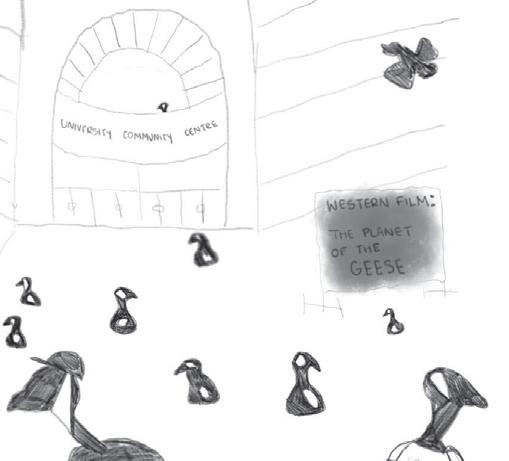

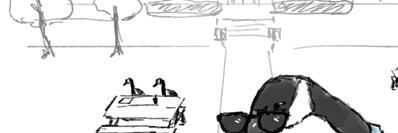


Despite its humorous marketing and humble beginnings, Winder’s founders say they have a serious mission — prioritizing safety and fostering genuine connections.
“[On Tinder] you never really know peoples’ intentions. We figured we could create an app that is more wholesome, that you connect with people based on shared interests, like faculty and other school related things,” says Yungblut. “In the age of social media, when you swipe past another person, they’re just another face in the crowd. We
believe people are going to be using Winder longterm because they’re creating genuine connections they can’t get anywhere else.”
Although Winder’s initial bugs were smoothed out shortly after the launch, Yungblut says it is still very much “a work in progress.”
The app was only back up and running for a few days until user activity was paused again on March 17 in order to improve the back-end function of the app, as well as to take student feedback into account. As of publishing, there isn’t a specific timeline for when Winder will be back up and running.
“At the end of the day, we have no idea if Winder is going to be profitable, but I think not having too rigid expectations is what has allowed us to flourish so far,” says Yungblut. “If anything, we’re trying to make these connections for students on campus in a safe way. That’s what every initiative we create through Winder boils down to.”

CULTURE | P12 They‛re gone! WESTERN FILM: PLANET OF THE GEESE CHIARA WALLACE GAZETTE ELIZABETH
I‛m gonna miss this place when I graduate... WALKING HOME FROM CLASS THE STUDENT HOUSE KITCHEN Welp. Won‛t miss THIS... Email LUCAS ARENDER GAZETTE
HART GAZETTE
LAUREN MEDEIROS GAZETTE
The chalkboard menu at the cafe, March 20, 2023.
Replace us! Email managing@westerngazette.ca The Gazette student newspaper








































 BIANCA COLLIA COORDINATING EDITOR
BIANCA COLLIA COORDINATING EDITOR





 LAUREN MEDEIROS CULTURE EDITOR
LAUREN MEDEIROS CULTURE EDITOR




 KIERAN DROVER SPORTS EDITOR
KIERAN DROVER SPORTS EDITOR

















